Learning Japanese? Speak like a native with these 69 wonderful Japanese idioms translated into English.
Feeling stressed? The Japanese have an idiom for that, It is easier to give birth than to worry about it. (案ずるより産むが易し。)Need health advice? Eight-tenths full keeps the doctor away. (腹八分に医者いらず (はらはちぶにいしゃいらず). Made a mistake? Don’t worry, Even monkeys fall from trees (猿も木から落ちる。 )
From Japanese proverbs to idioms and wonderful idiomatic expressions, take this list of inspiring words of wisdom into your day. And remember, 一期一会 (いちごいちえ) We only live once, so cherish every moment!
Here some common Japnese idioms, their literal translations, meanings, and English equivalents.
1. 自業自得 – Jigou jitoku
Literal translation: One’s act, one’s profit.
Meaning: This Japanese idiom means that eventually, you will face the consequences of your actions.
English equivalent: What goes around, comes around. You reap what you sow. You get what you give. Getting one’s just desserts. Reap what you sow.
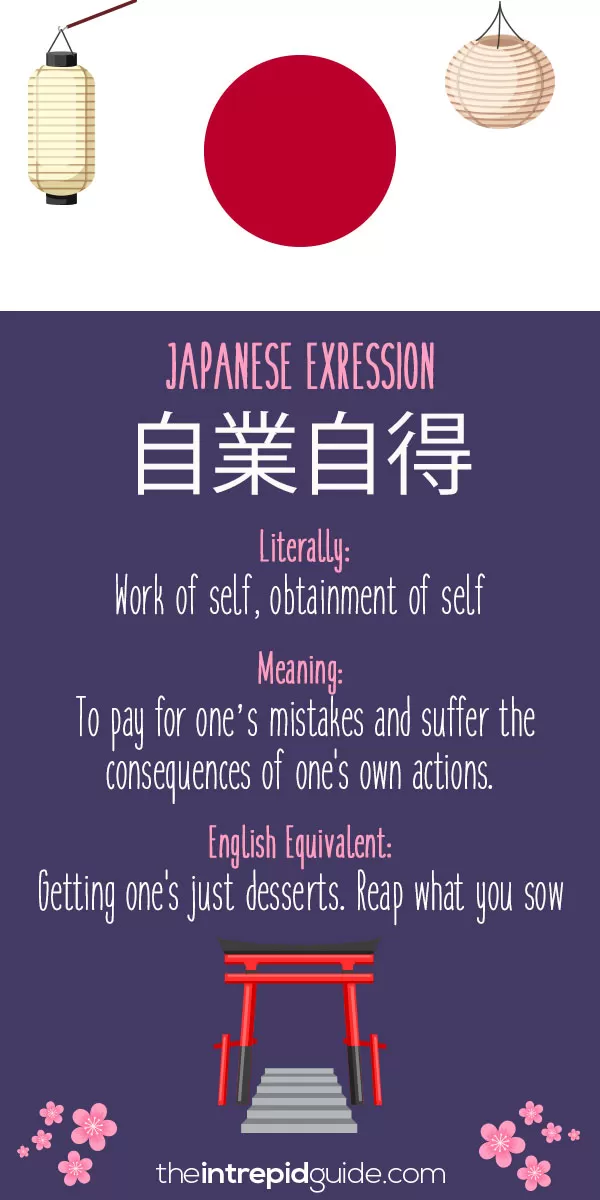
2. 十人十色 (じゅうにんといろ)
Literal translation: Ten men, ten colours
Meaning: People have different tastes and preferences and are free to like different things
English equivalent: To each his own. Different strokes for different folks.
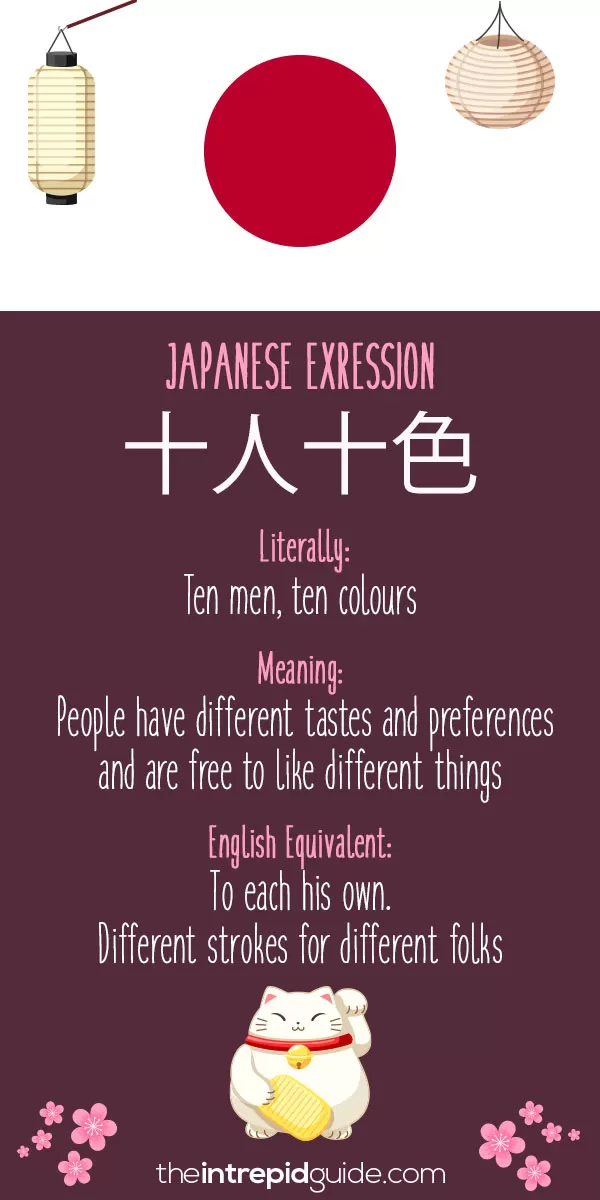
3. 起死回生 (きしかいせい) – Kishikaisei
Literal translation: Wake from death and return to life. Resuscitation.
Meaning: To turn a negative situation into a positive one.
English equivalent: When life gives you lemons, make lemonade. Make the best of a bad situation. Every cloud has a silver lining.
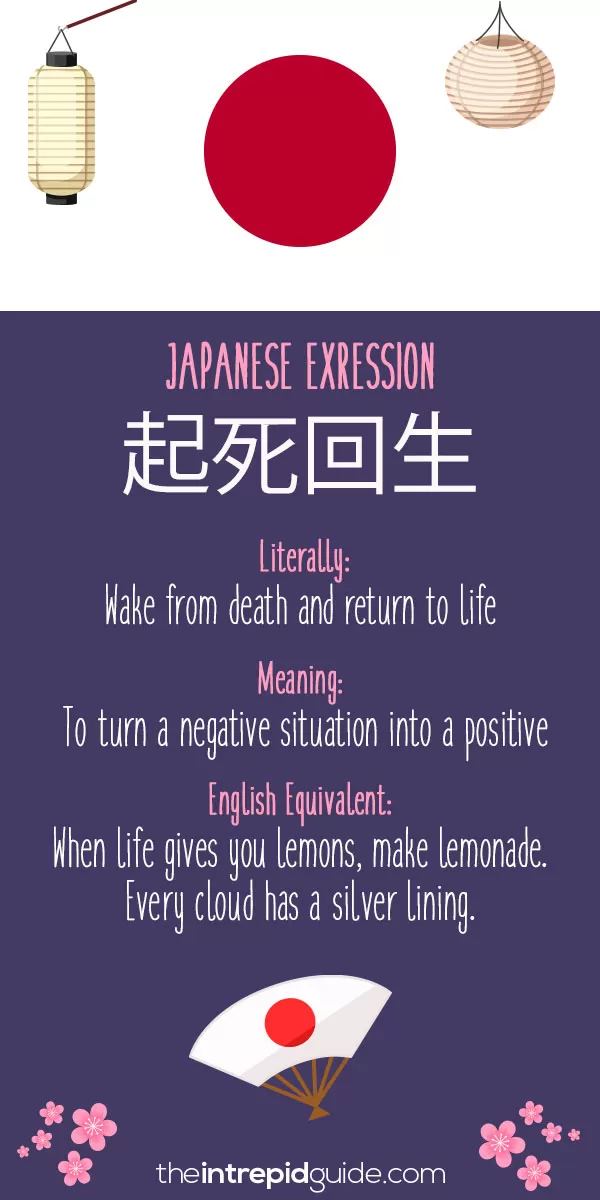
4. 我田引水
Literal translation: Drawing water to one’s own rice paddy fields.
Meaning: To do or say something for your own benefit.
English equivalent: Take advantage of.
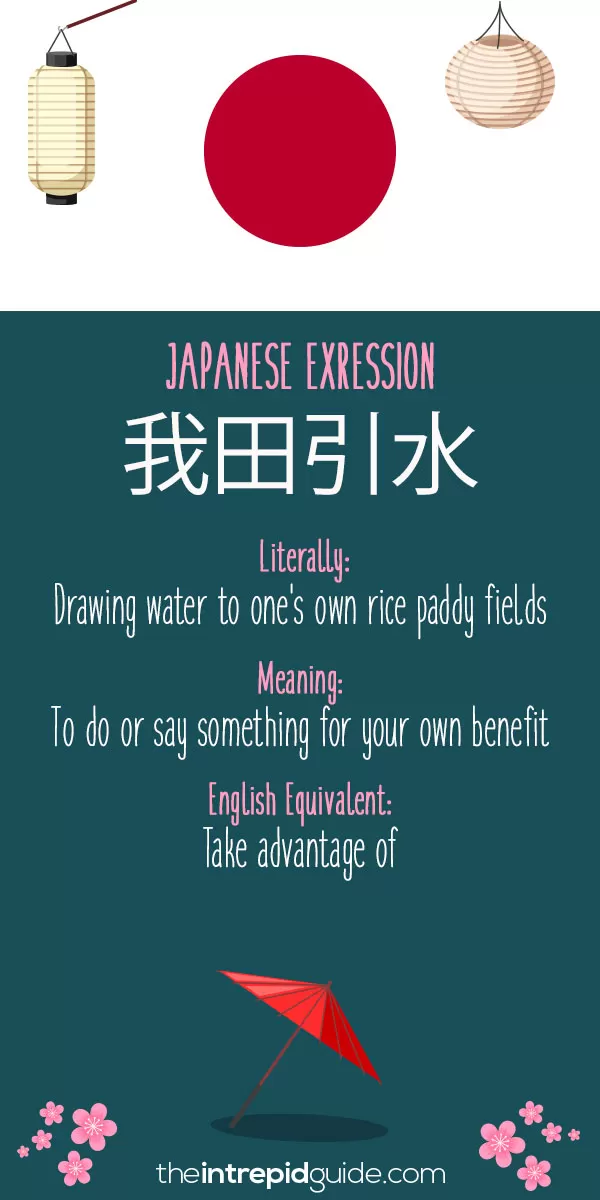
5. 悪因悪果
Literal translation: Evil cause, evil effect.
Meaning: Similar to 自業自得 that “you will reap what you sow.” This Japanese proverb suggests a karmic intervention.
English equivalent: You get what you deserve.
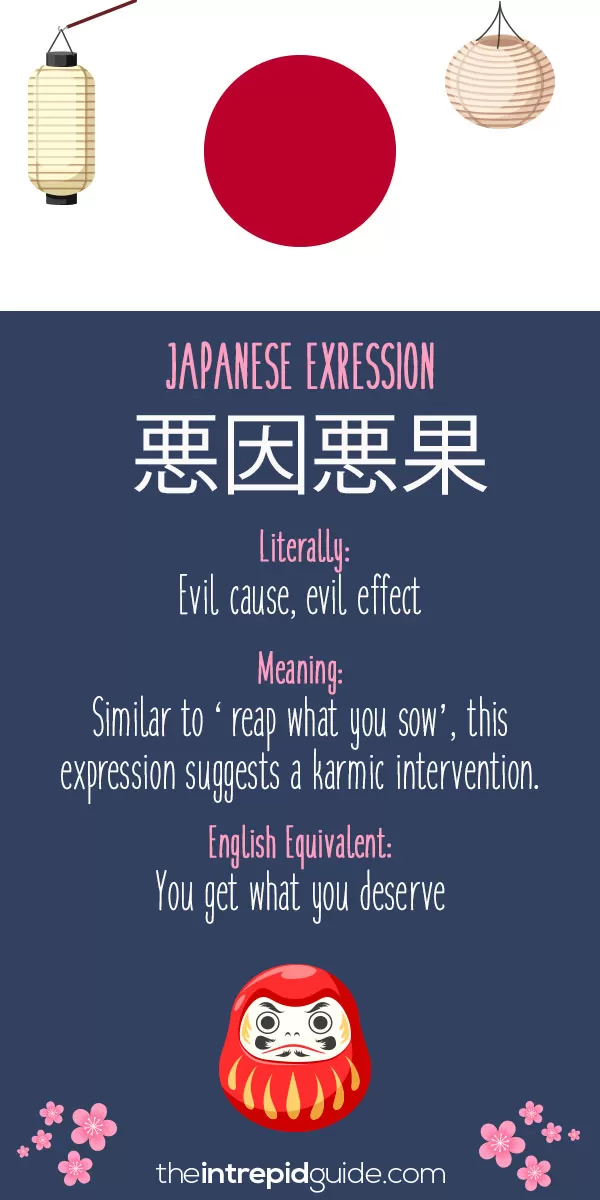
6. 見ぬが花
Literal translation: Not seeing is a flower.
Meaning: Things often look more beautiful in your imagination than in reality. In Japan, flowers are used to represent imagination, beauty, and oftentimes politeness.
English equivalent: Reality can’t compete with the imagination. Prospect is often better than possession.
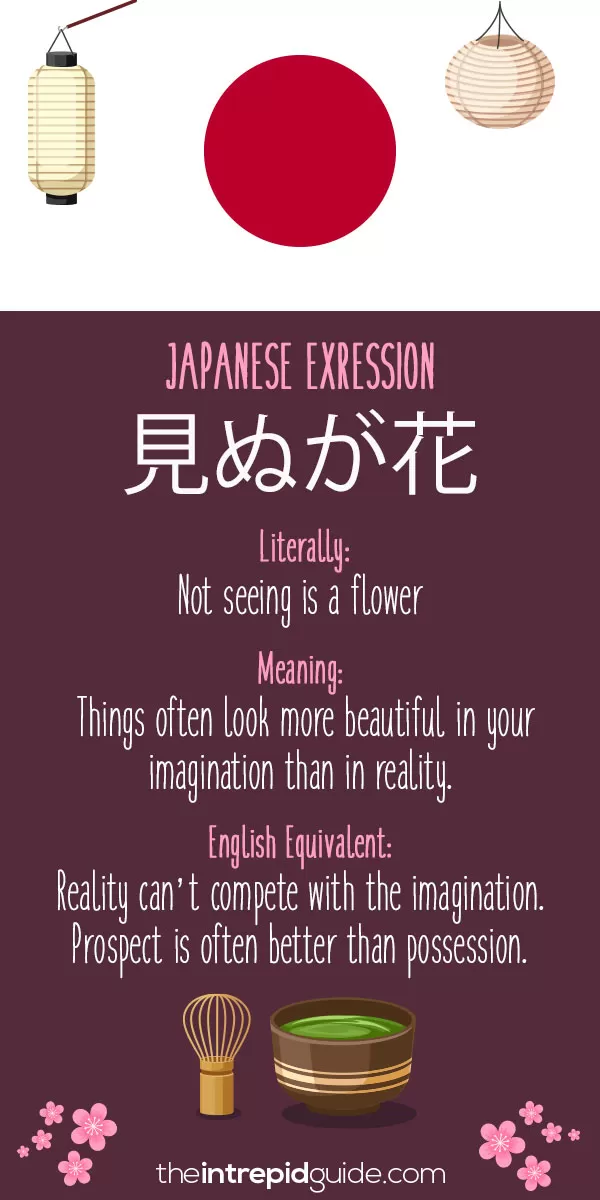
7. 弱肉強食
Literal translation: The weak are meat; the strong eat.
Meaning: The most able or fit are the ones who survive.
English equivalent: Survival of the fittest. Law of the jungle.
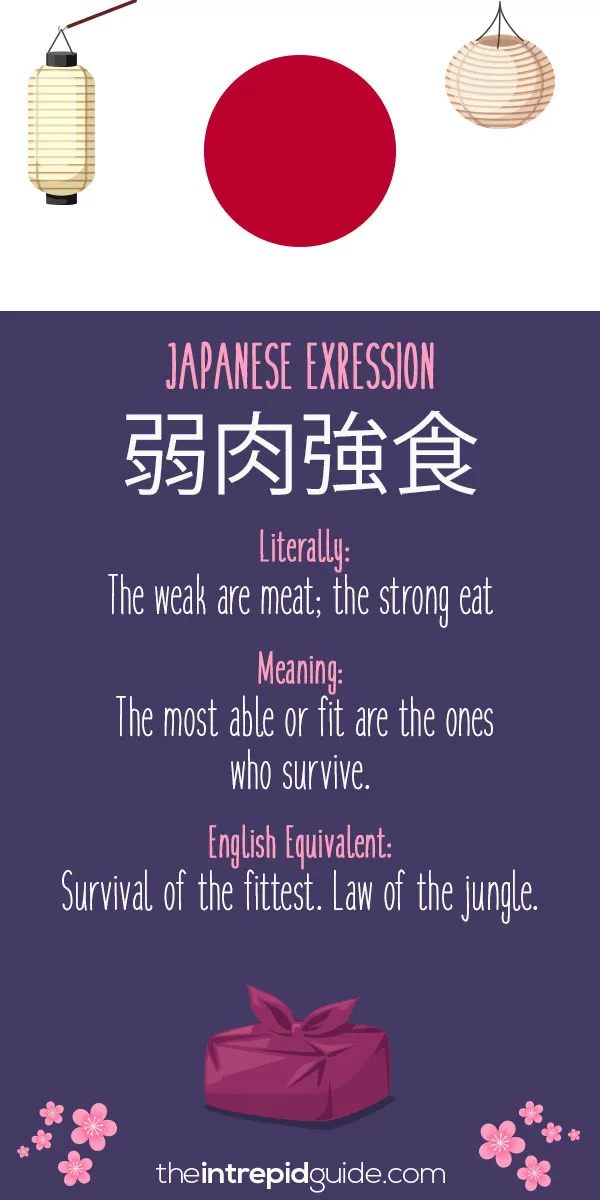
8. 海千山千
Literal translation: Ocean thousand, mountain thousand.
Meaning: Someone who’s had a lot of experience and can handle any situation. They are usually exceptionally clever, cunning, or shrewd, especially in devious or underhanded ways.
English equivalent: A sly old fox. Sly old dog. Old fox.
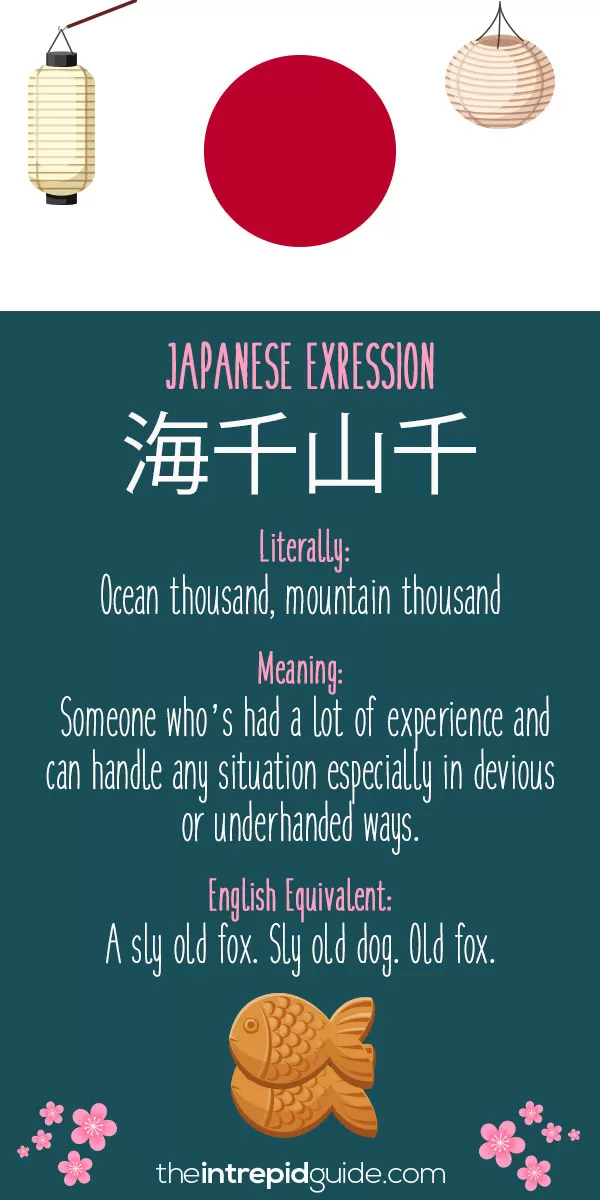
9. 酔生夢死
Literal translation: Drunken life, dreamy death.
Meaning: To spend all your time daydreaming without accomplishing anything.
English equivalent: To have your head in the clouds.
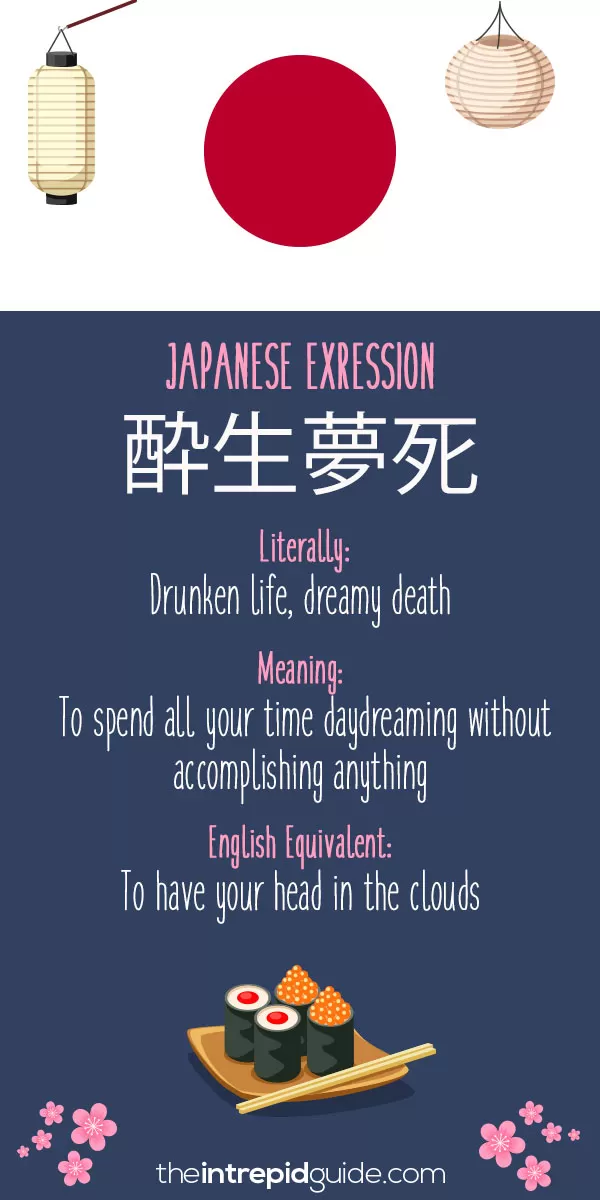
10. 一期一会 (いちごいちえ)
Literal translation: One life, one encounter.
Meaning: This Japanese proverb means that each and every moment is a once-in-a-lifetime encounter that should be cherished because you’ll only experience it once.
English equivalent: Seize the day. You only live once.
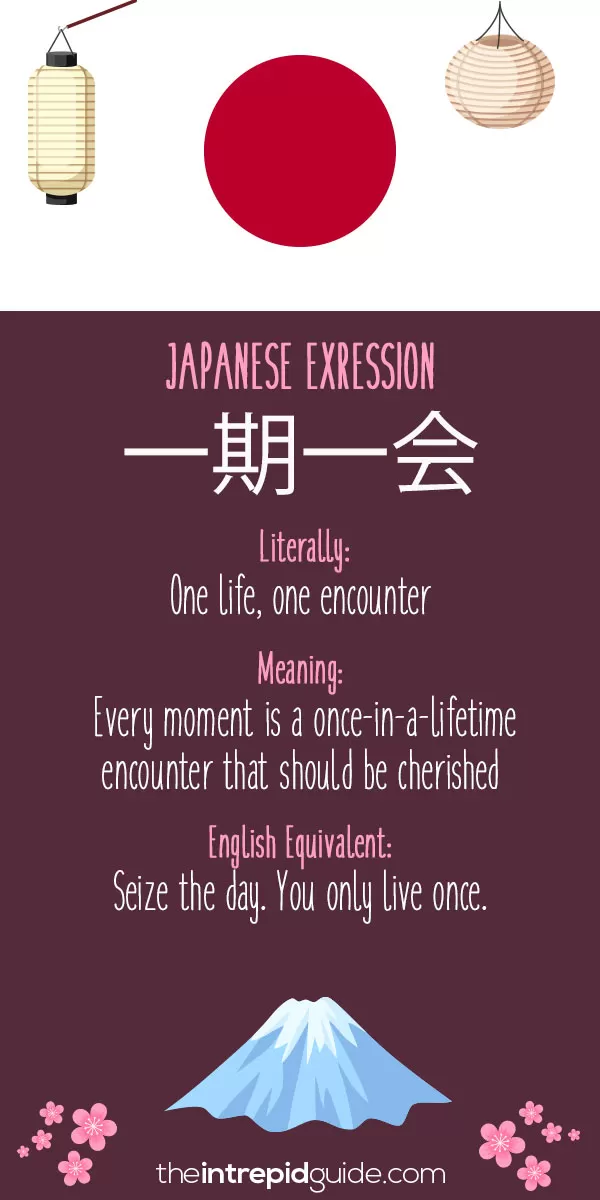
11. 異体同心 (いたいどうしん)
Literal translation: Different body, same mind. Two bodies, one heart.
Meaning: Refers to like-minded people who share similar interest and/ or beliefs.
English equivalent: Brother from another mother. Kindred spirits. Soul mates.
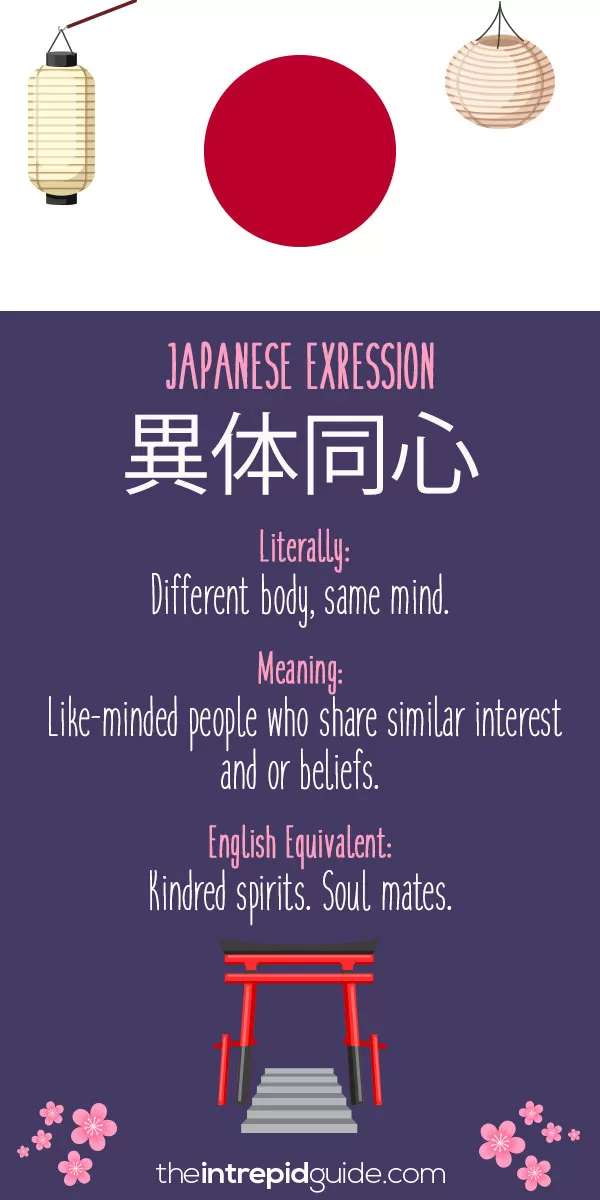
12. 羊頭狗肉
Literal translation: Sheep head, dog meat.
Meaning: When something has been misrepresented on purpose.
English equivalent: Crying wine and selling vinegar. False advertising.
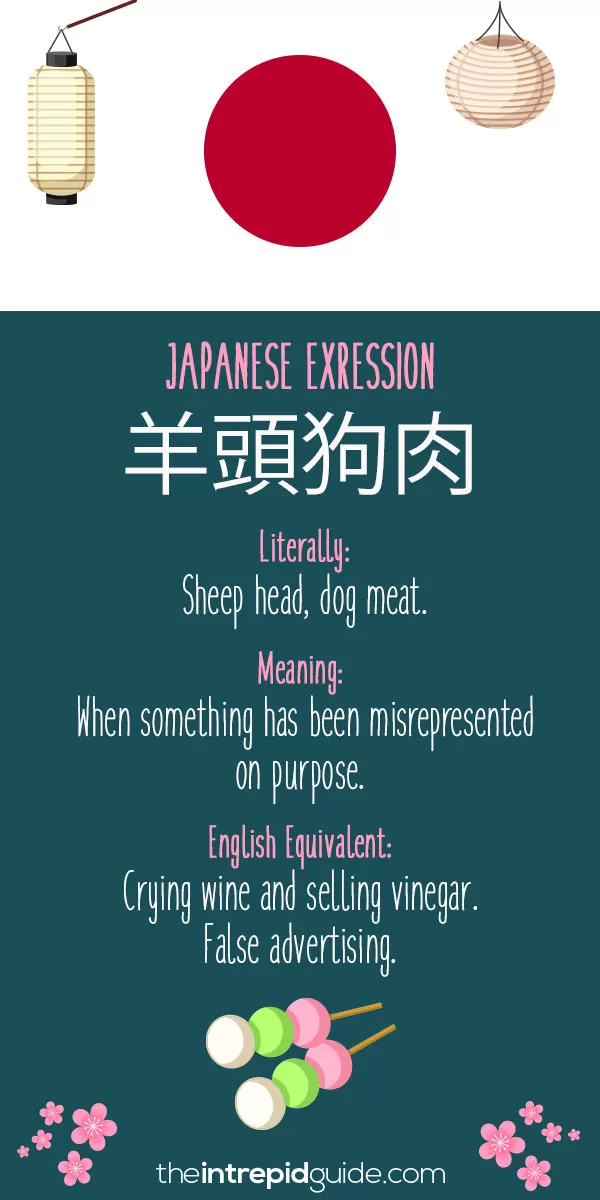
13. 会者定離
Literal translation: People meet, always part.
Meaning: This idea comes from Buddhism, that every human relationship will end someday due to the transient nature of life.
English equivalent: Those who meet must part. All good things must end.
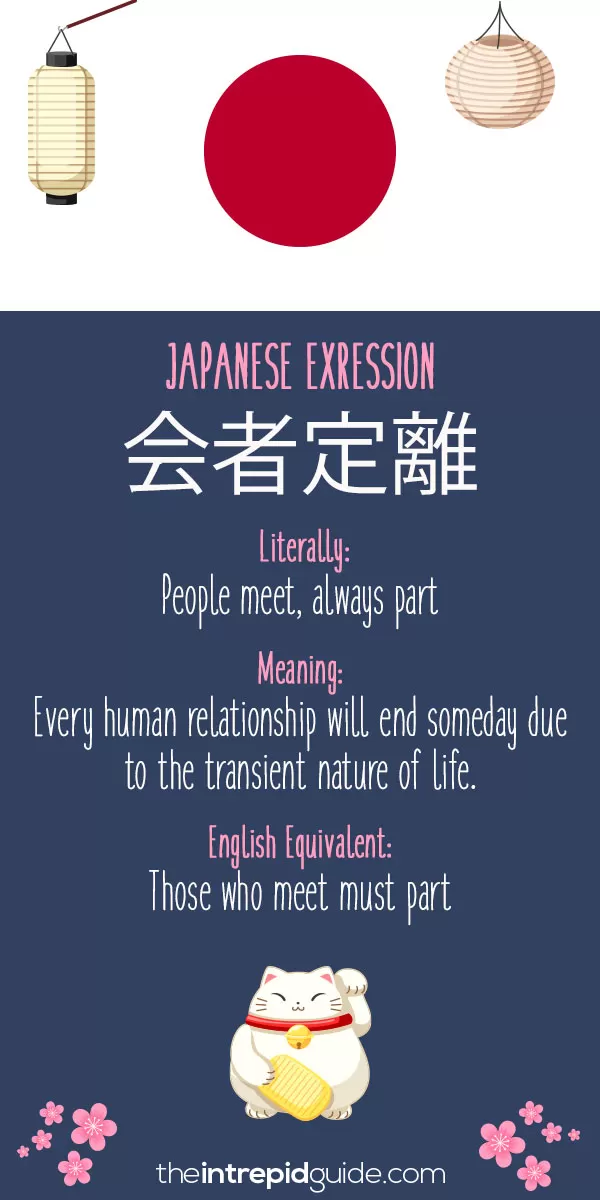
14. 美人薄命
Literal translation: Beautiful person, thin life.
Meaning: This Japanese idiom expresses the idea that beauty and long life seldom go together.
English equivalent: Beauty fades.
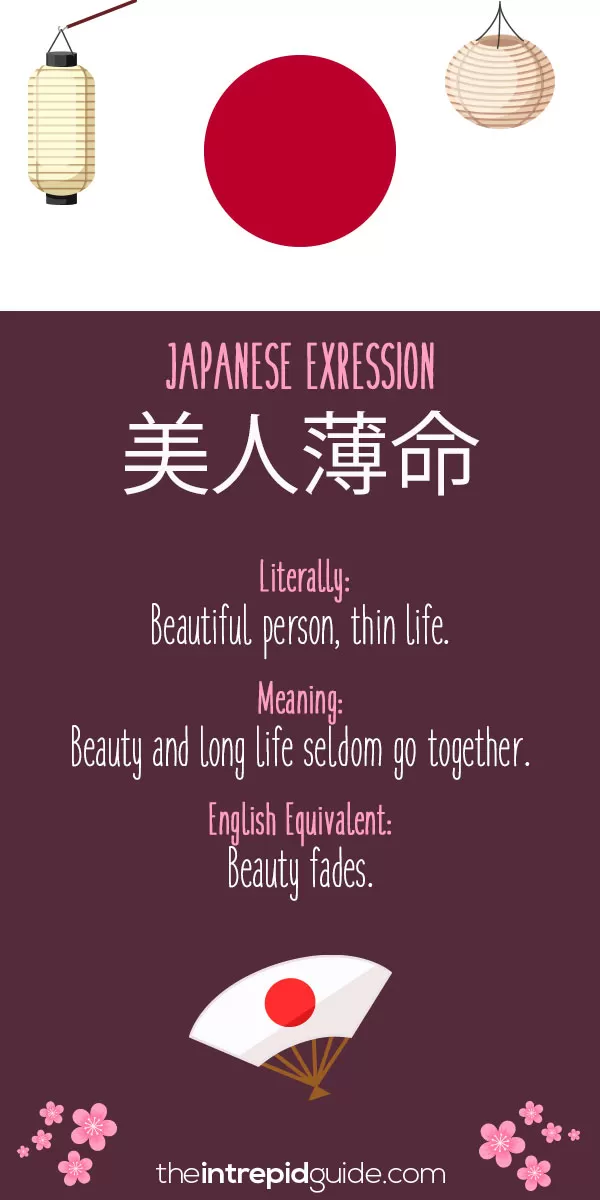
15. 負けるが勝ち – Makeru ga kachi
Literal translation: To lose means to win.
Meaning: The idea that sometimes it’s best not to engage in combat or conflict and to save your energy for more important things.
English equivalent: Better to bend than break. Agree to disagree. Live to fight another day.
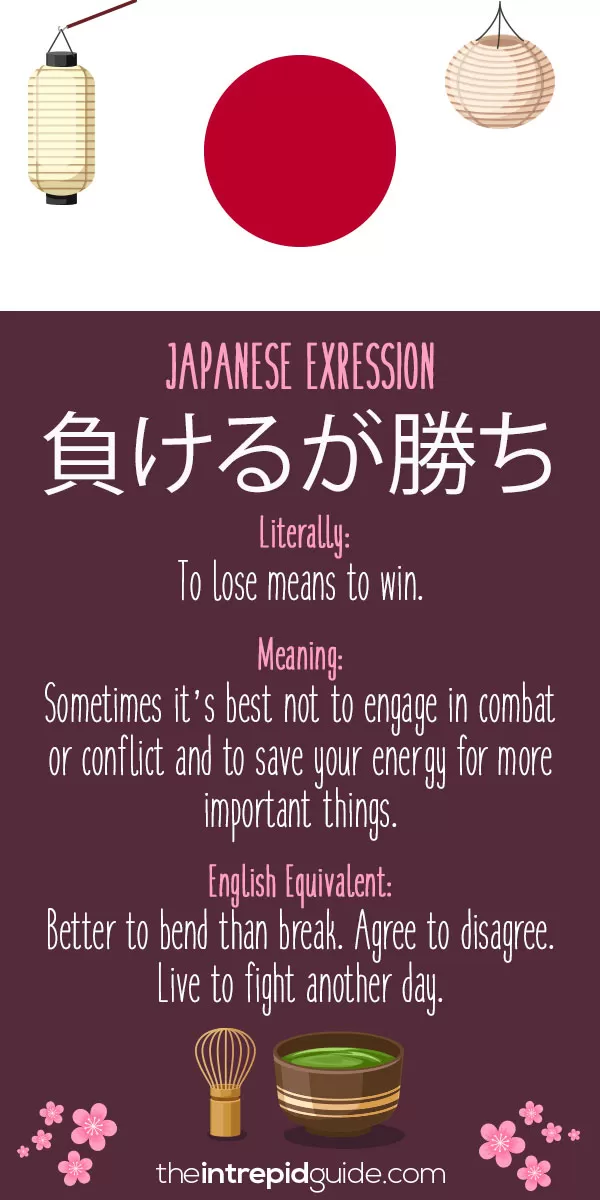
16. 虎穴に入らずんば虎子を得ず。
Literal translation: If you do not enter the tiger’s cave, you won’t catch its cub.
Meaning: You won’t achieve anything unless you take risks.
English equivalent: Nothing ventured, nothing gained. Fortune favours the bold.
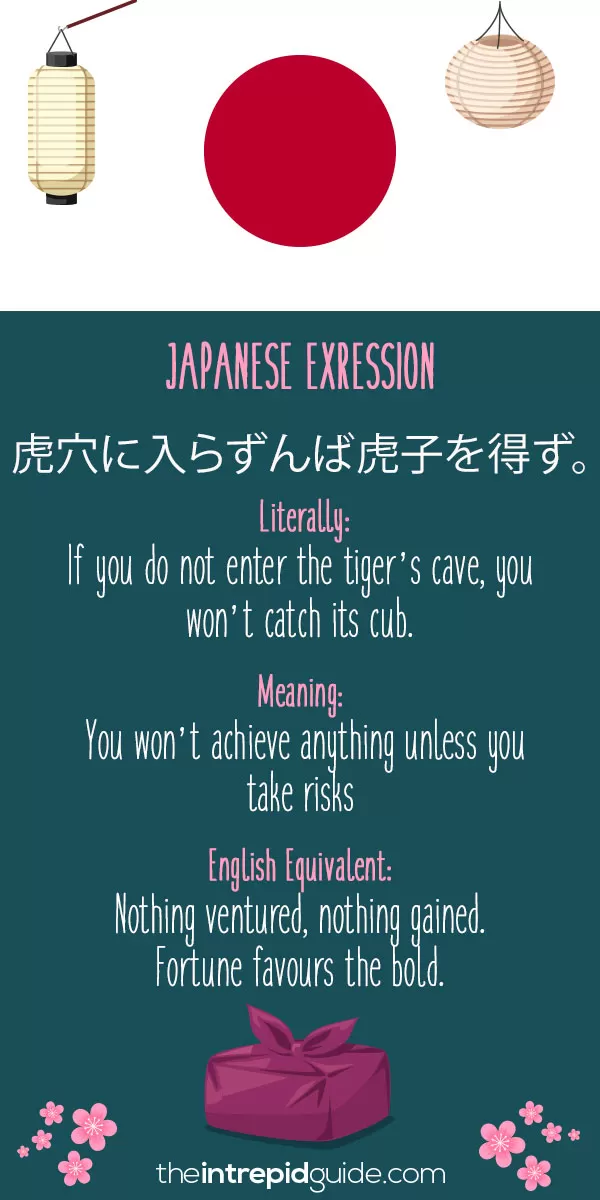
17. 猿も木から落ちる。- Saru mo ki kara ochiru
Literal translation: Even monkeys fall from trees.
Meaning: This Japanese idiom means that we all make mistakes but that’s no big deal. It’s just life’s way of teaching us a lesson that we learn from.
English equivalent: Everyone makes mistakes.
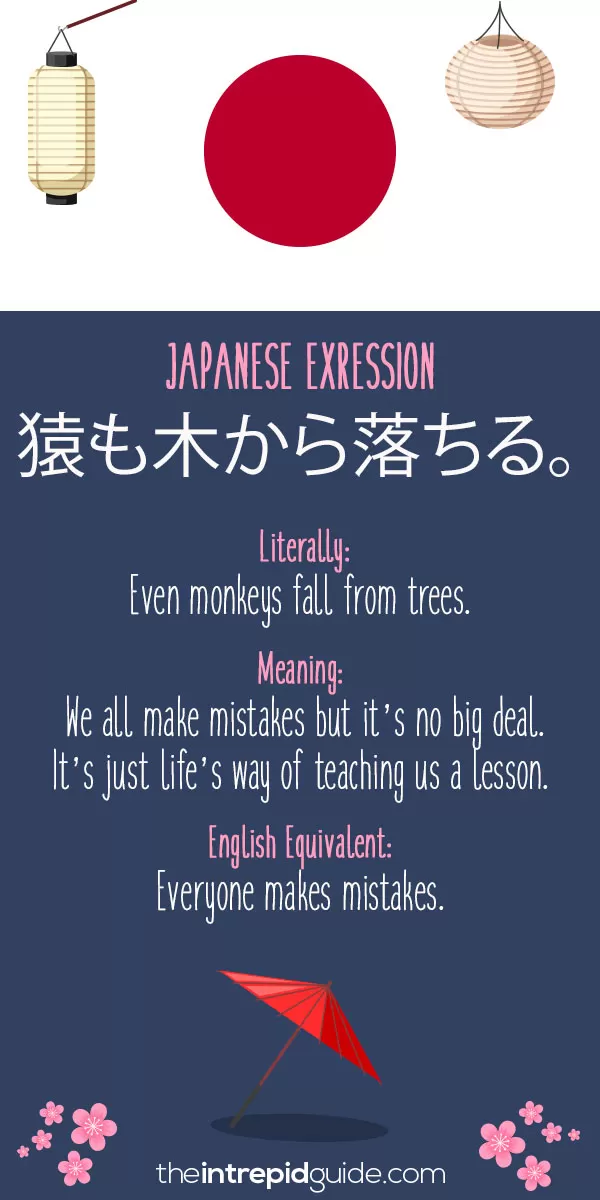
18. 蓼食う虫も好き好き
Literal translation: There are even bugs that eat knotweed.
Meaning: The idea that different people like different things, which you don’t necessarily agree with or understand. The Japanese knotweed is referenced here as one such example since it’s one of the world’s fastest-spreading species.
English equivalent: Every worm to his taste; some prefer to eat nettles. There’s no accounting for taste. Every man to his taste.
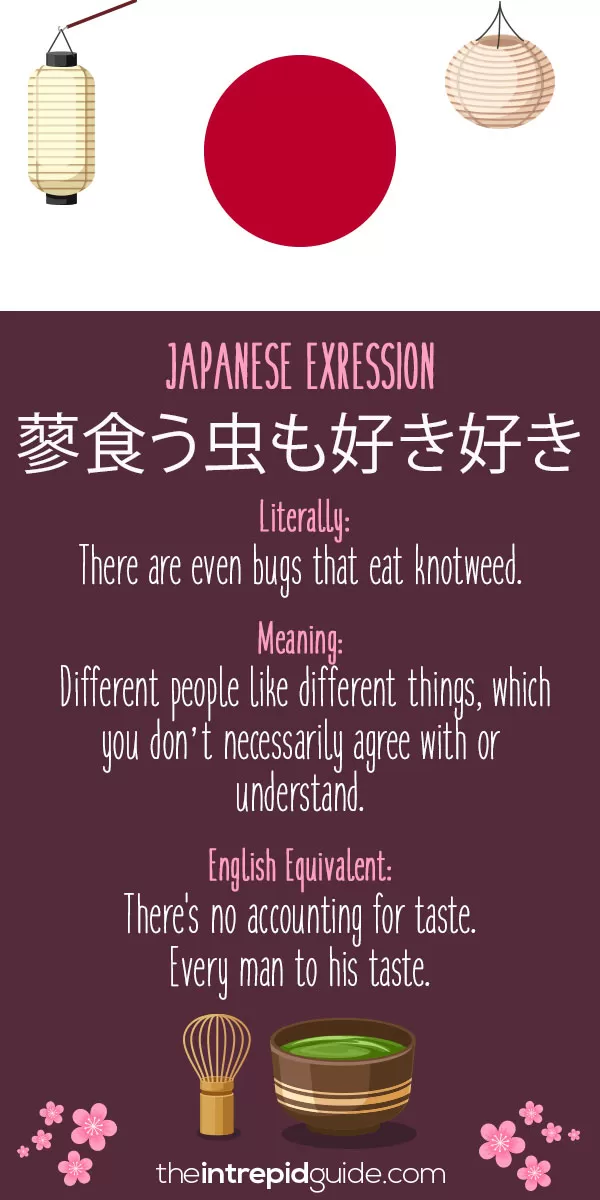
19. 蛙の子は蛙。
Literal translation: Child of a frog is a frog.
Meaning: The idea that a child will usually share the same character or similar qualities to his or her parents.
English equivalent: Like father, like son. The apple doesn’t fall far from the tree.
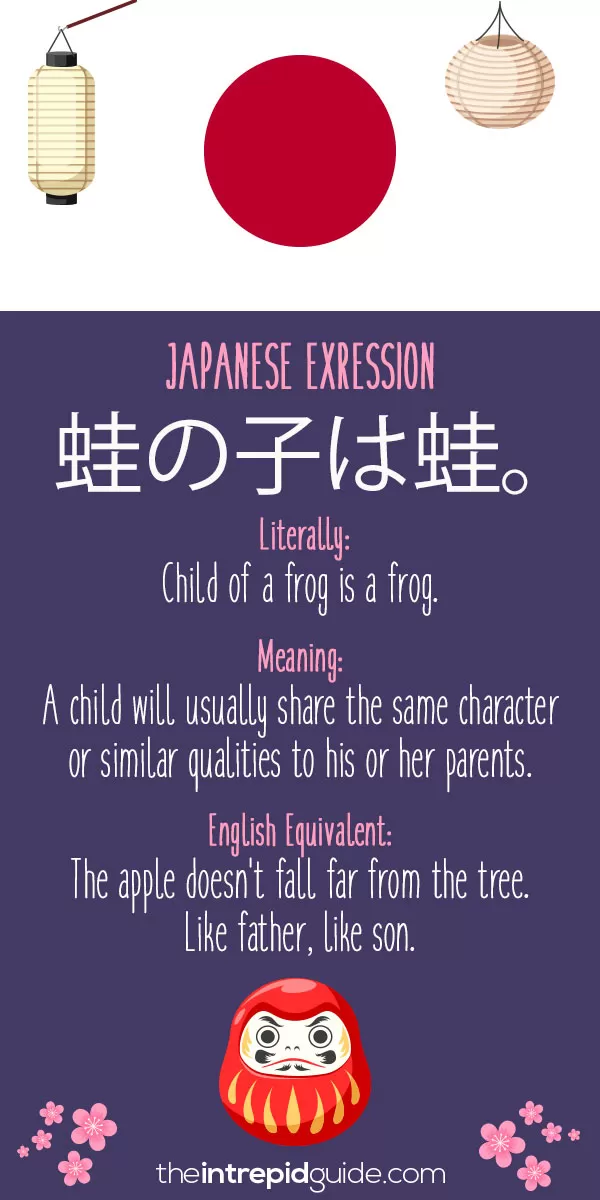
20. 覆水盆に帰らず。
Literal translation: Spilt water will not return to the tray.
Meaning: The idea that what is done cannot be undone.
English equivalent: No use crying over spilled milk. It is what it is.
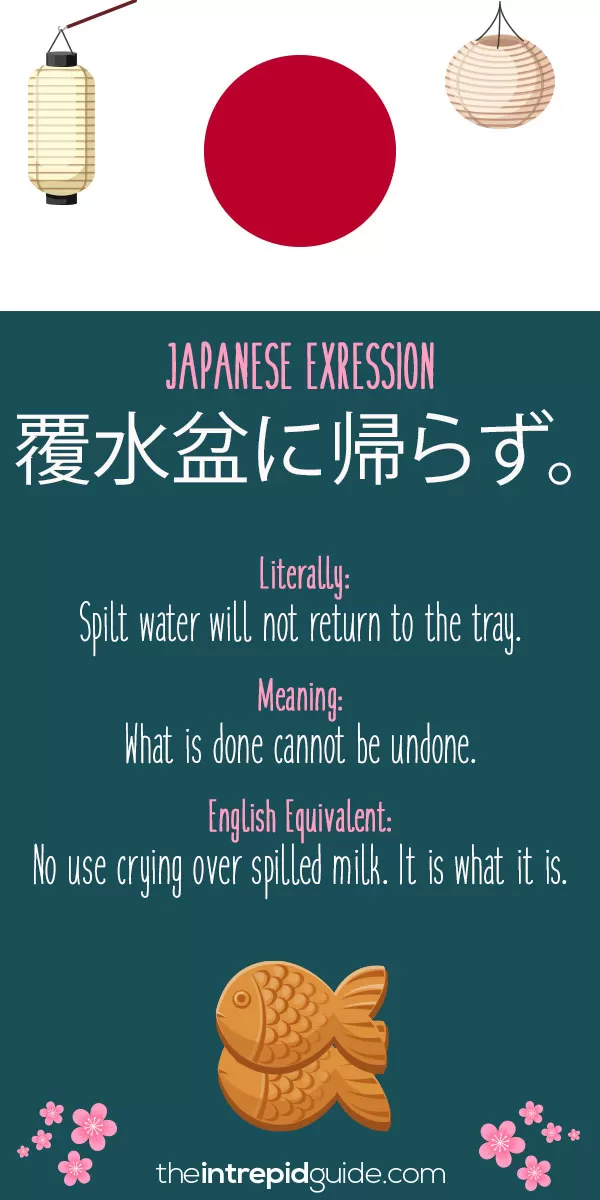
21. 知らぬが仏 – Shiranugahotoke
Literal translation: Not knowing is Buddha.
Meaning: This Japanese idiom expresses the idea that you can keep your mind at peace, like Buddha, if you don’t know or expose yourself to anything negative.
English equivalent: Ignorance is bliss. What you don’t know can’t hurt you.
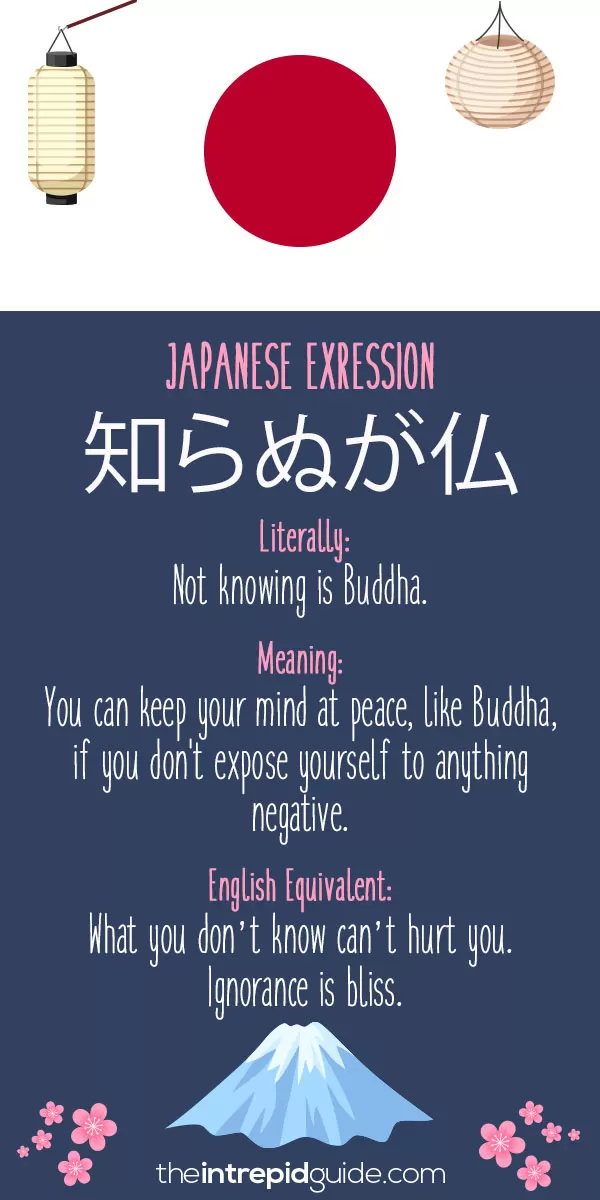
22. 猫に小判 (ねこにこばん)
Literal translation: Gold coins to a cat. A koban to a cat. (A koban is a golden coin that was used hundreds of years ago in Japan.)
Meaning: To give something valuable to someone who does not understand its value. This expression can also be used to describe someone who owns or wears things that don’t really suit them.
English equivalent: To cast pearls before swine.
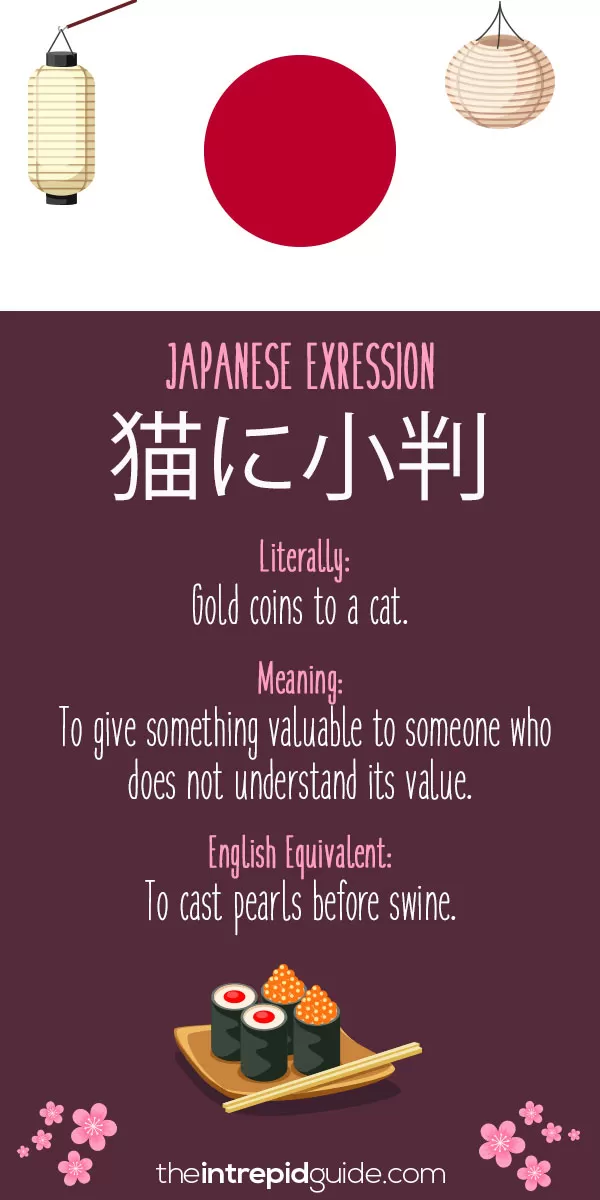
23. 井の中の蛙、大海を知らず – I no naka no kawazu, taikai wo sirazu
Literal translation: A frog in a well does not know the great sea.
Meaning: Someone who is powerful or important but only within a small group of people. This famous Japanese idiom comes from a short tale about a frog who was born and lived in a well. The frog was proud that he was the biggest creature in the well and believed he was invincible. When we decided to leave the well, he ended up in the ocean and soon realized he wasn’t so big, special or invincible after all.
English equivalent: Big fish in a small pond.
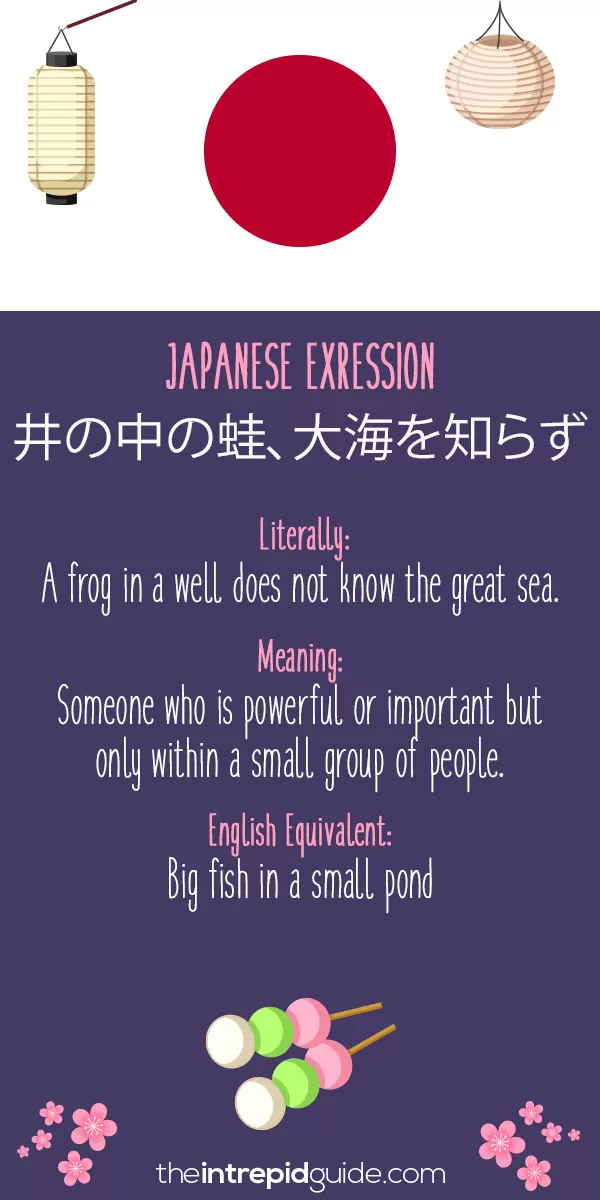
24. 二兎を追う者は一兎をも得ず。- Nito wo ou mono wa itto mo ezu
Literal translation: One who chases after two hares won’t even catch one.
Meaning: If you try to do two things at once, you will fail at both. This Japanese idiom expresses the idea that you shouldn’t be greedy and do too much at once. You should only focus on one thing at a time. As Ron Swanson said, “Never half-ass two things. Whole-ass one thing.”
English equivalent: If you run after two hares you will catch neither.
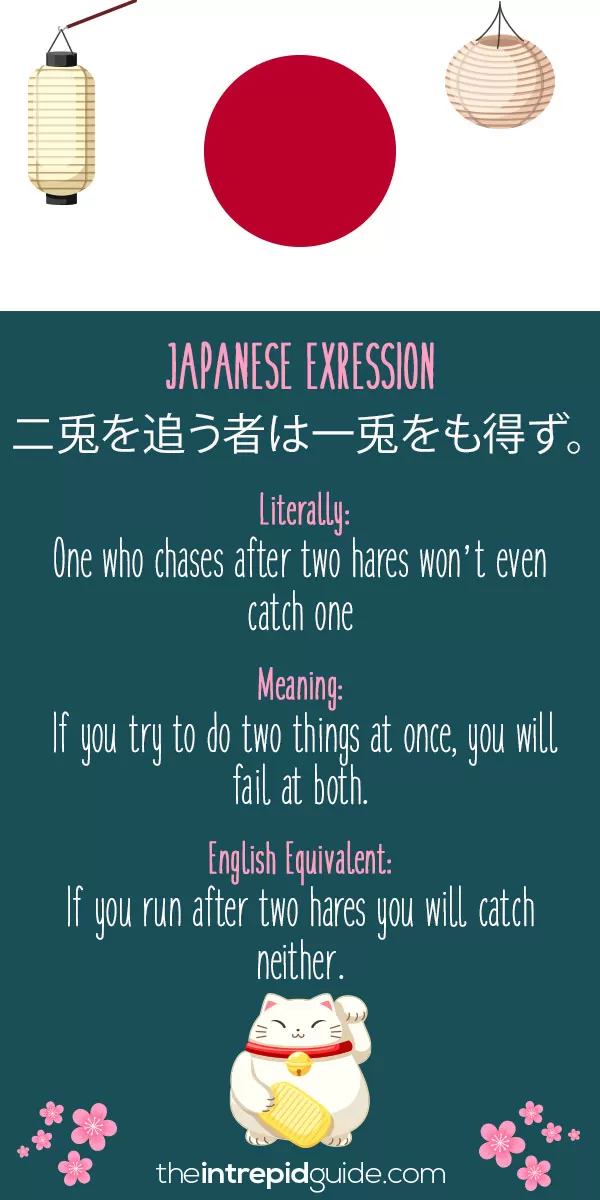
Want to have fun whilst learning Japanese? Struggling to find decent Japanese language resources? I recommend getting uTalk. Available as a desktop site and app, uTalk is awesome for learning key words and phrases, especially if you want to use it for travel purposes. It’s great for beginners getting started in a language and invaluable for intermediates looking to fill in gaps in their vocabulary and pronunciation.
What I love most about uTalk is that you can jump around their extensive library of topics and choose what you want to learn, when you want, and at your own pace. Because I believe in uTalk so much, I reached out to them and we’ve teamed up to offer you an exclusive 30% OFF reader discount across all of uTalk’s 140 languages! This offer isn’t available anywhere else! Click here to claim your exclusive 30% discount on Japanese.
25. 門前の小僧習わぬ経を読む。
Literal translation: A young monk outside the gate can read sutras he has never studied.
Meaning: You learn, without realising it, from what is around you.
English equivalent: To be a product of your environment.
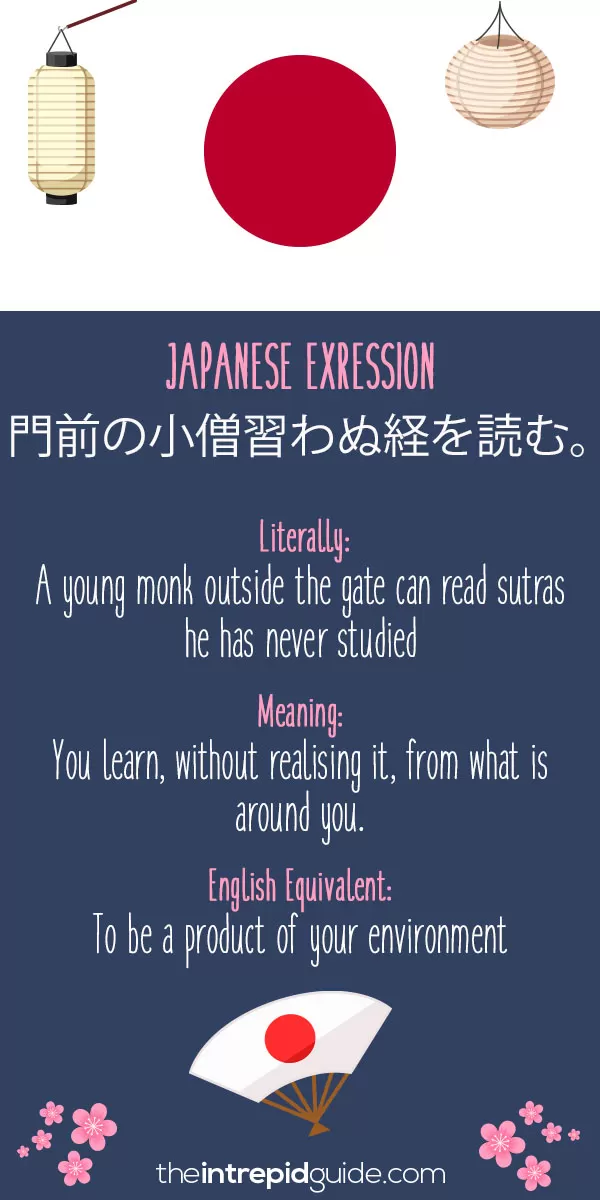
26. 七転び八起き (ななころびやおき)
Literal translation: Fall down seven times, stand up eight.
Meaning: Don’t give up, your persistence will pay off in the end. When life knocks you down seven times, the eighth time you stand up is what counts in the end — not the seven falls or failures.
English equivalent: If at first, you don’t succeed, try, try again. Perseverance is better than defeat.
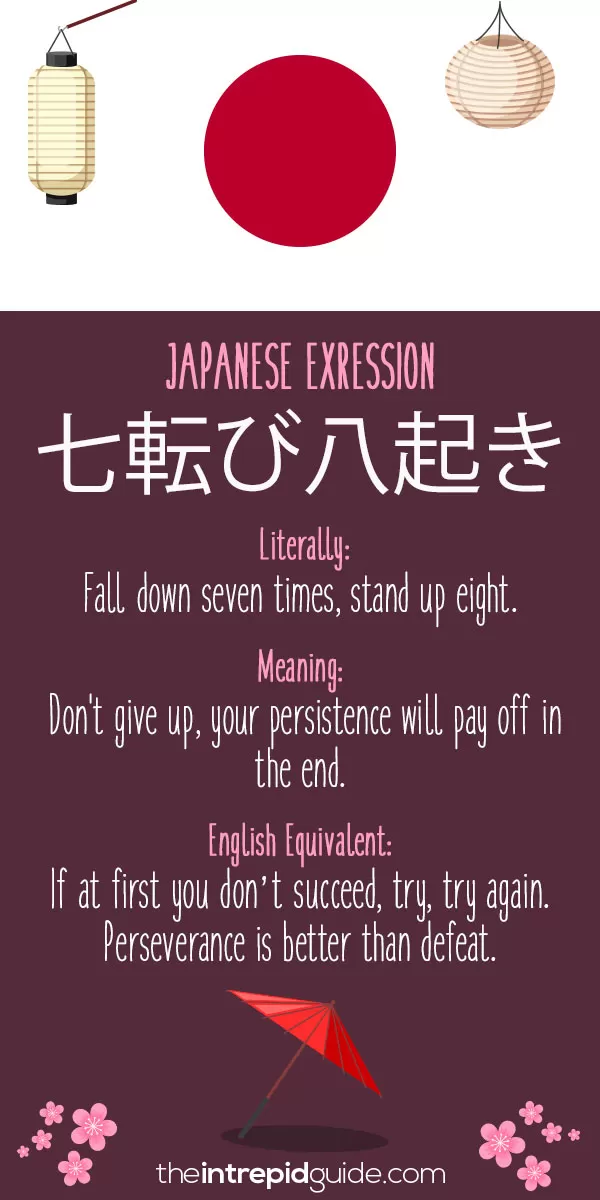
27. 案ずるより産むが易し。
Literal translation: It is easier to give birth than to worry about it.
Meaning: This Japanese idiom points out that the act of stressing out about something is usually worse than the thing you’re actually stressing out about.
English equivalent: Doing something is easier than worrying about it. It is easier to do something than worry about it. Fear overruns the danger.
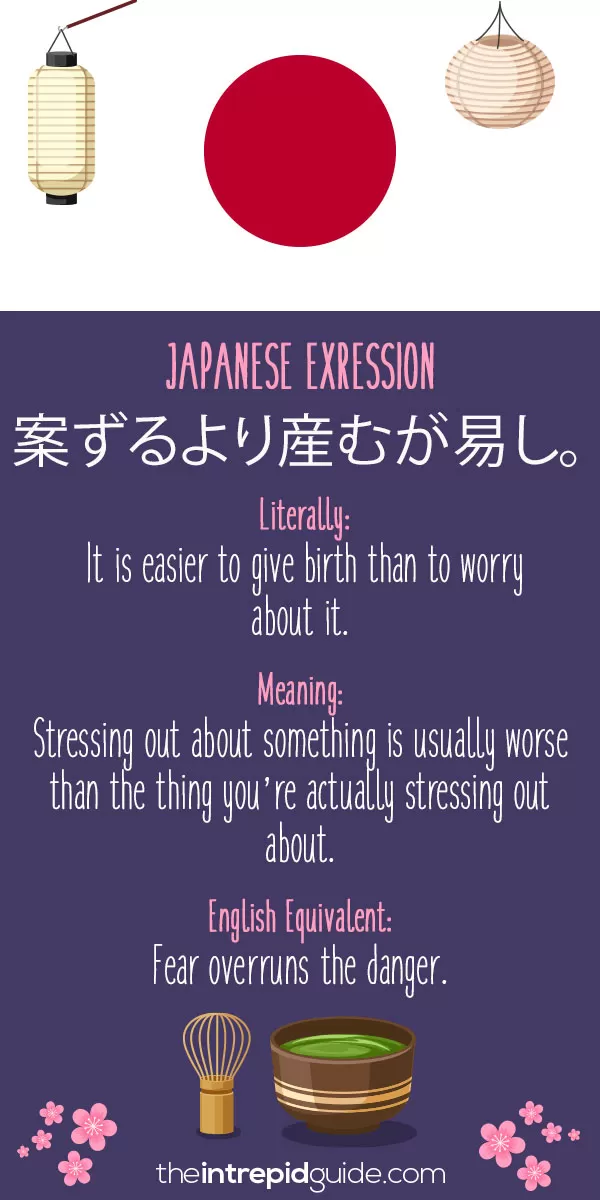
28. 馬鹿は死ななきゃ治らない。
Literal translation: Unless an idiot dies, he won’t be cured.
Meaning: There is no cure for ignorance. Nothing can be done to help someone who is ignorant or stupid.
English equivalent: Only death will cure a fool. You can’t fix stupid. Once a fool, always a fool.
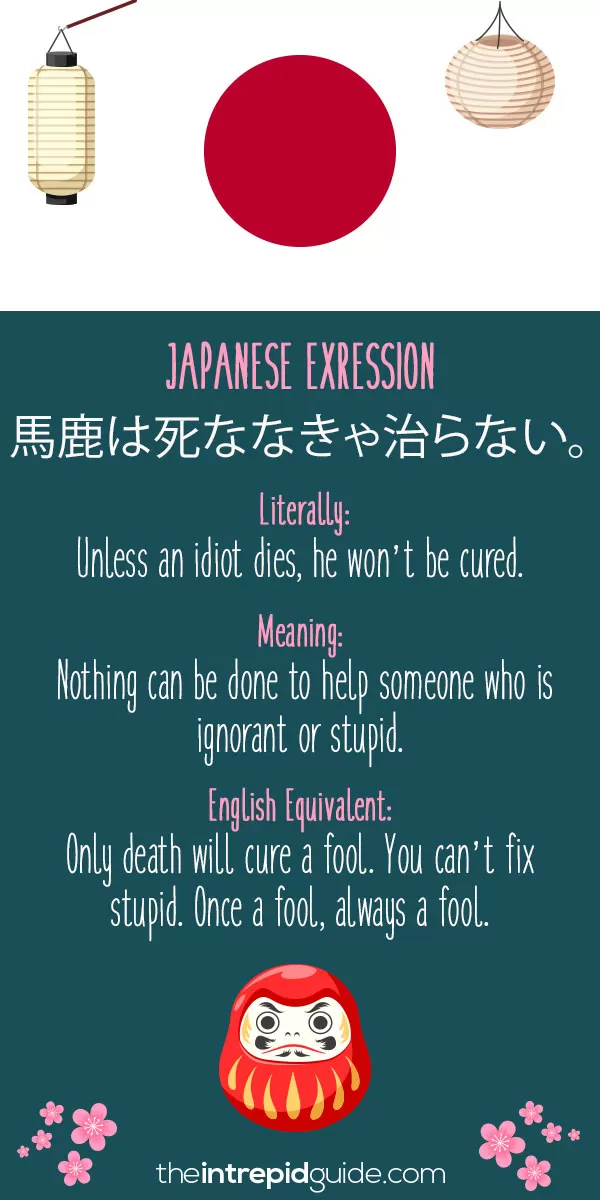
29. 秋茄子は嫁に食わすな。
Literal translation: Don’t feed autumn eggplant to your wife (because they’re too delicious, because they’ll give her the chills, or because their lack of seeds will reduce her fertility).
Meaning: Don’t let others take advantage of you.
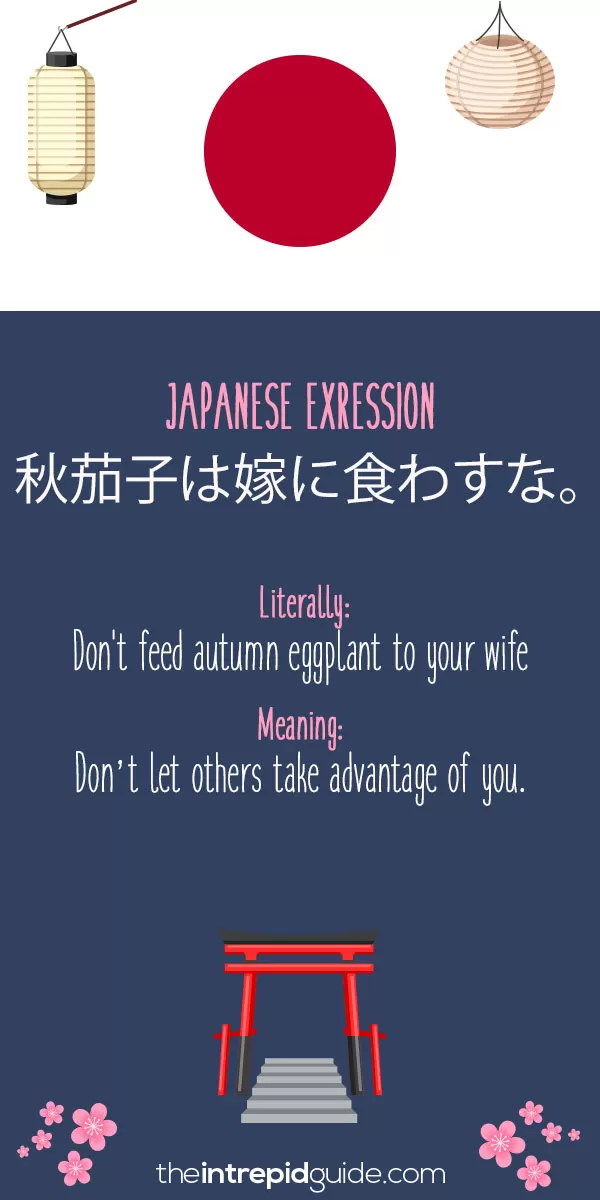
30. 花より団子
Literal translation: Dumplings rather than flowers.
Meaning: The idea that what is practical (food) is preferred over aesthetics (flowers).
English equivalent: Quality over quantity. Substance over style.
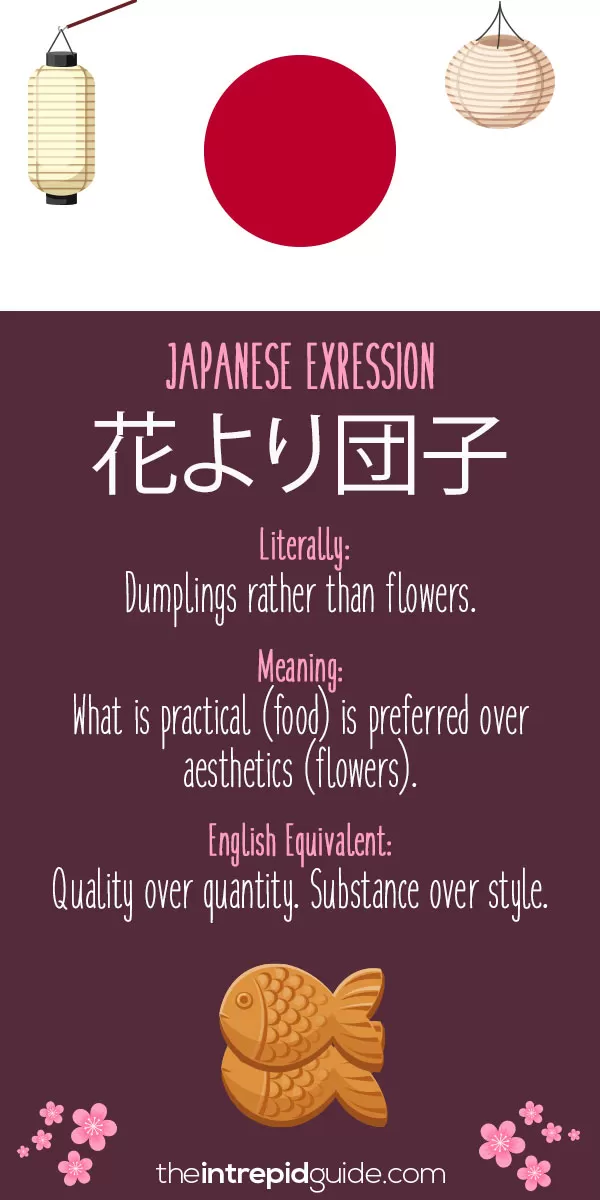
31. 口は災いの元 – Kuchi wa wazawai no moto
Literal translation: A mouth causes trouble.
Meaning: It’s better to say nothing than to accidentally say something wrong. A similar Japanese idiom is: 言わぬが花 (iwanu ga hana)
English equivalent: Silence is golden. Out of the mouth comes evil.
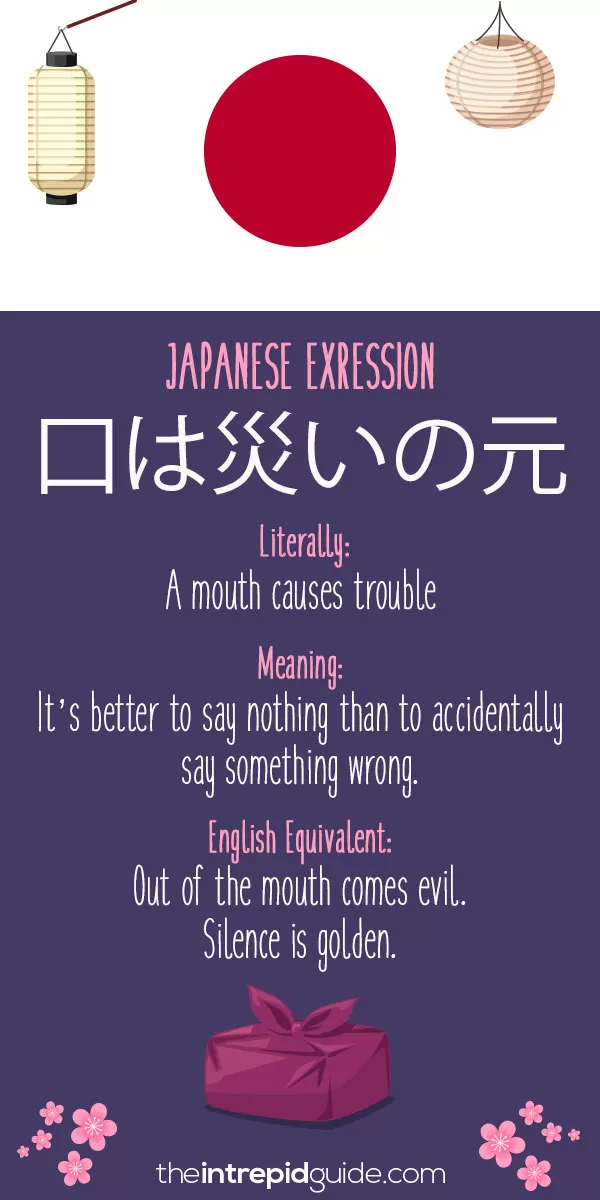
32. 能ある鷹は爪を隠す – Nô aru taka wa tsume wo kakusu
Literal translation: The skilful hawk hides its talons.
Meaning: Stay humble and don’t show off.
English equivalent: A wise man keeps some of his talents in reserve. Who knows most, speaks least.
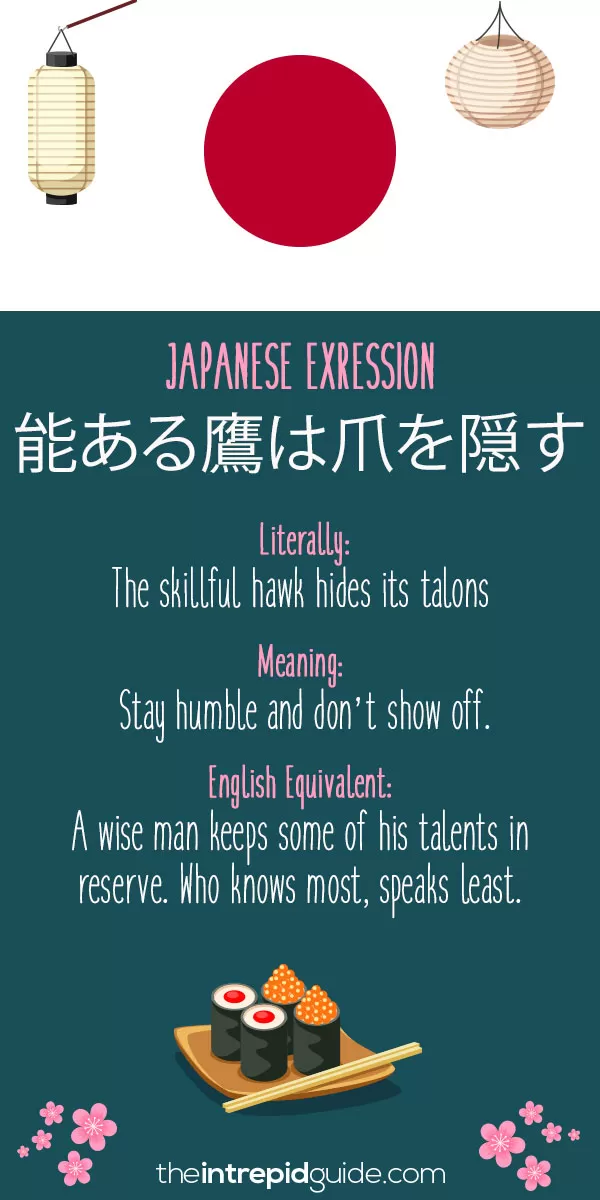
33. 武士は食わねど高楊枝 – Bushi wa kuwanedo takayôji
Literal translation: A Samurai pretends, even when he is starved, by holding a toothpick between his teeth.
Meaning: When you don’t let others see your pain because you are too proud.
English equivalent: Keep a stiff upper lip.
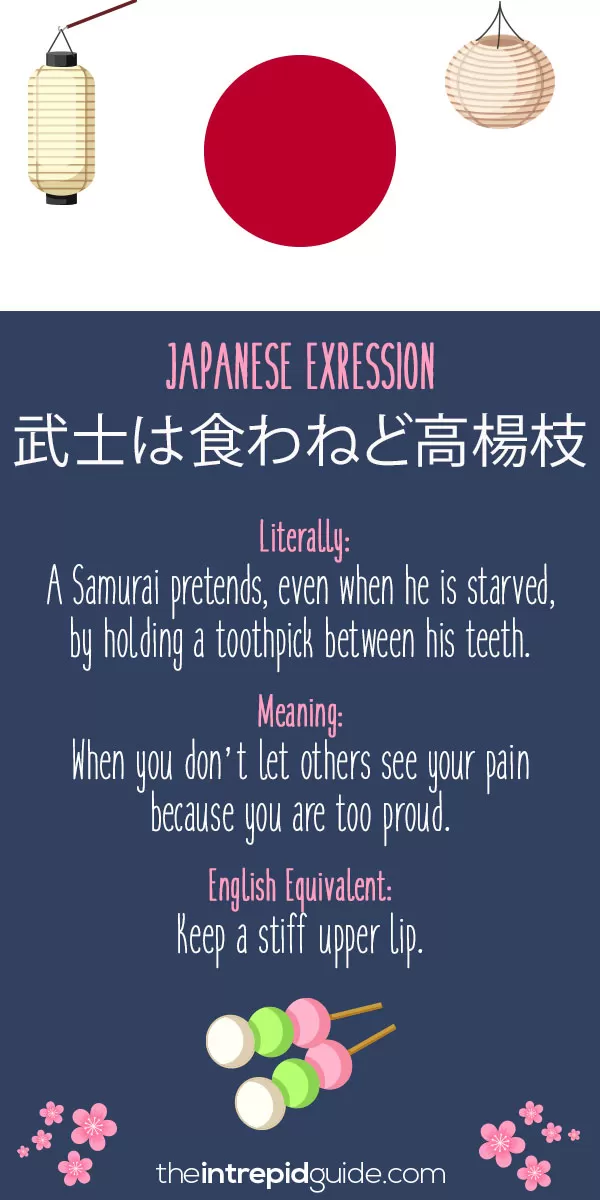
34. 悪銭身に付かず – Akusen mi ni tsukazu
Literal translation: Bad money won’t stick with you.
Meaning: This Japanese idiom states that if you make money by being dishonest or cutting corners, you will eventually lose your fortune.
English equivalent: Easy come, easy go. Ill-gotten gains are short-lived.
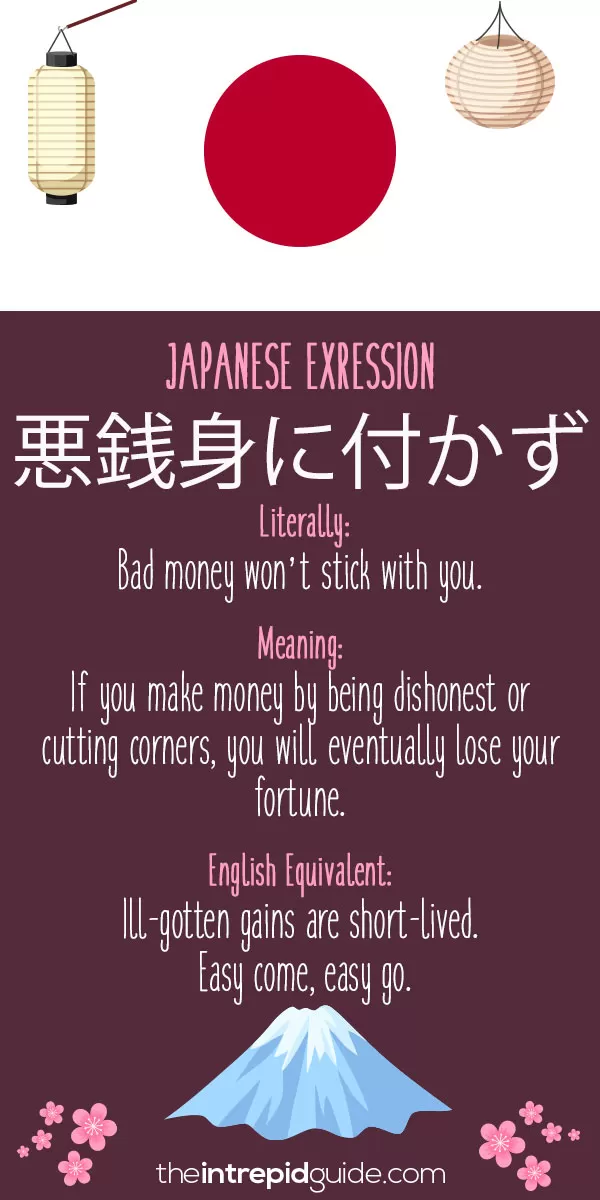
35. 郷に入っては郷に従え – Gô ni haitte wa gô ni sitagae
Literal translation: Enter the village, follow the township.
Meaning: When visiting a foreign land, you should follow and respect all local customs and traditions.
English equivalent: When in Rome, do as the Romans do.
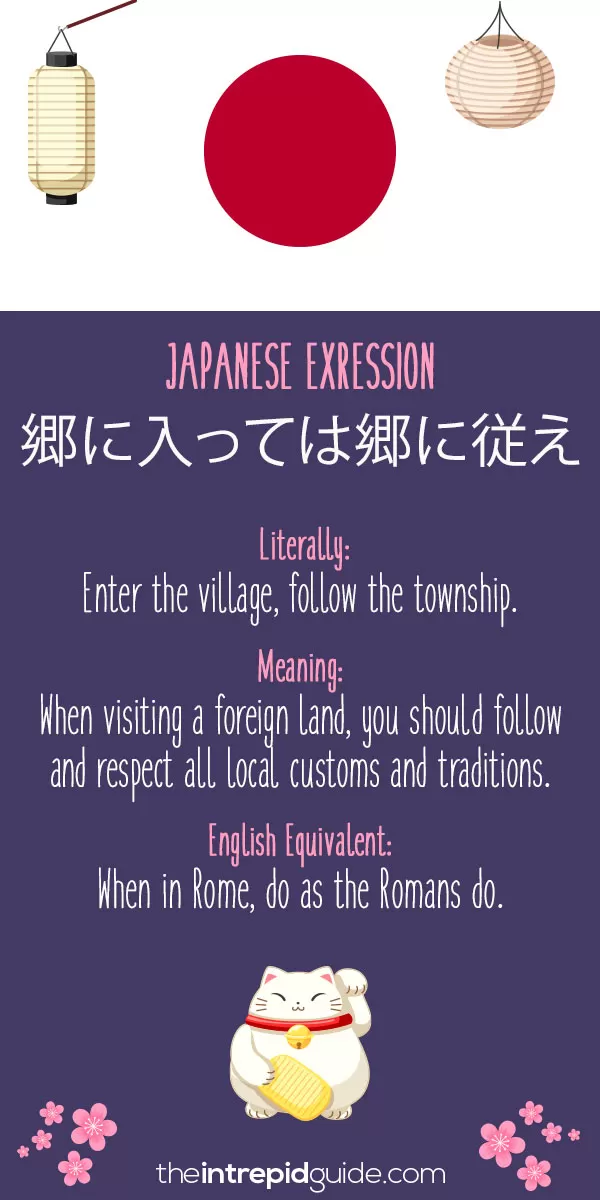
36. 石二鳥 – Isseki nityou
Literal translation: One stone two birds.
Meaning: To complete a task or solve two problems with one action or solution.
English equivalent: Kill two birds with one stone.
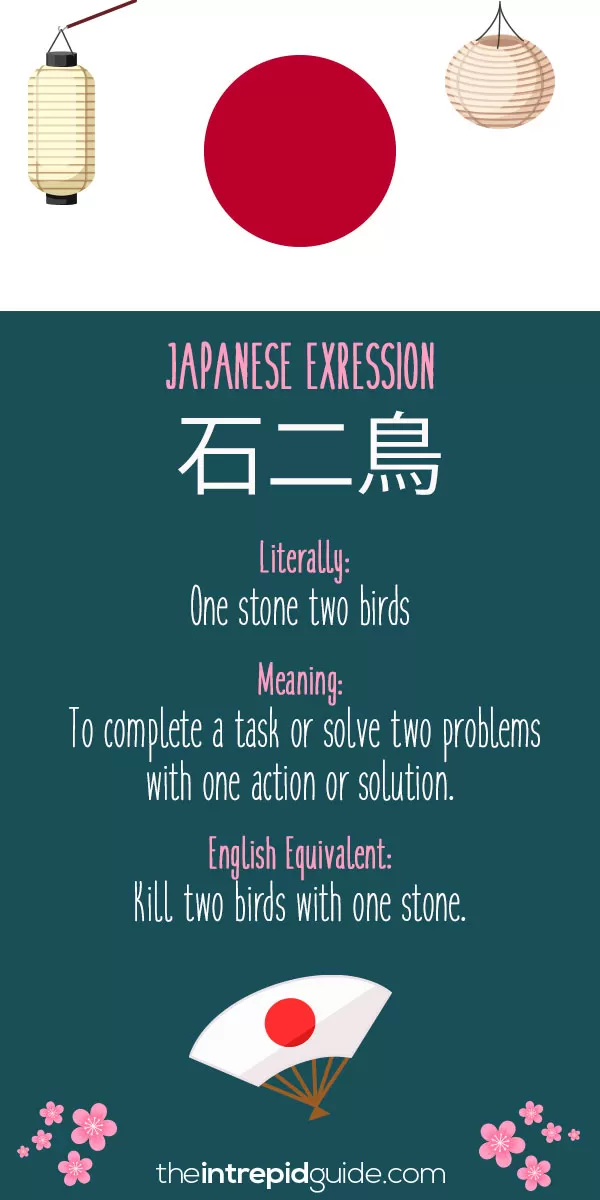
37. 頭に来る – Atama ni kuru
Literal translation: Come to mind, come to a head.
Meaning: This Japanese idiom means to get angry or mad.
English equivalent: Come to a head. Reach a boiling/breaking point. Lose one’s cool.
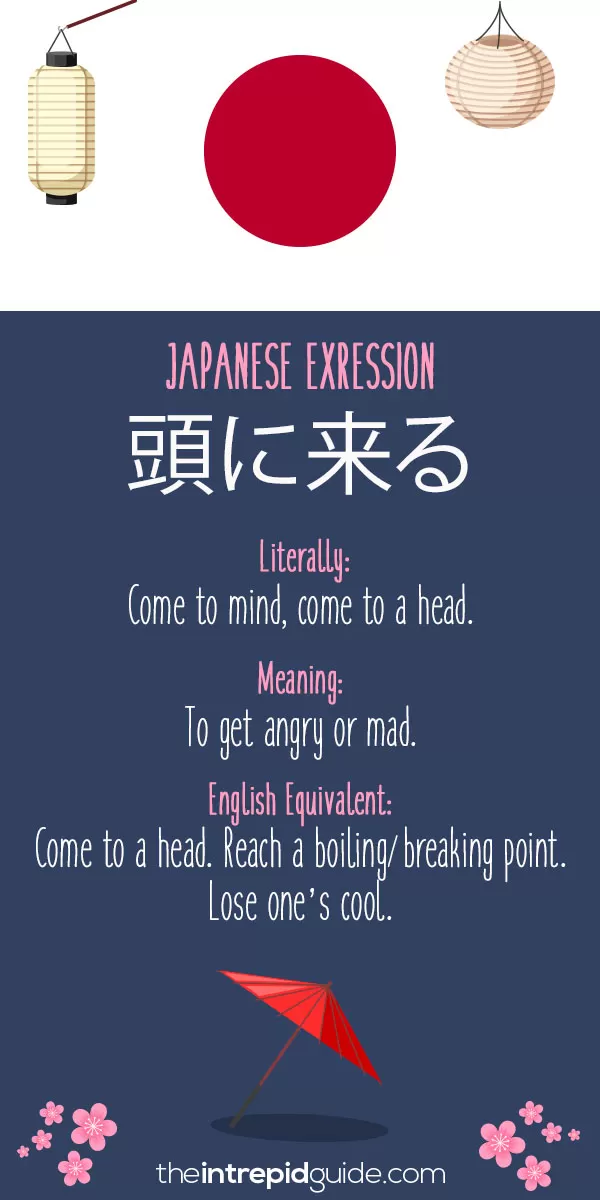
38. 会わせる顔がない – Awa seru kao ga nai
Literal translation: I have no face to meet.
Meaning: To be so ashamed or embarrassed that you won’t meet with others so as to avoid further embarrassment.
English equivalent: Ashamed to go out in public. Save face.
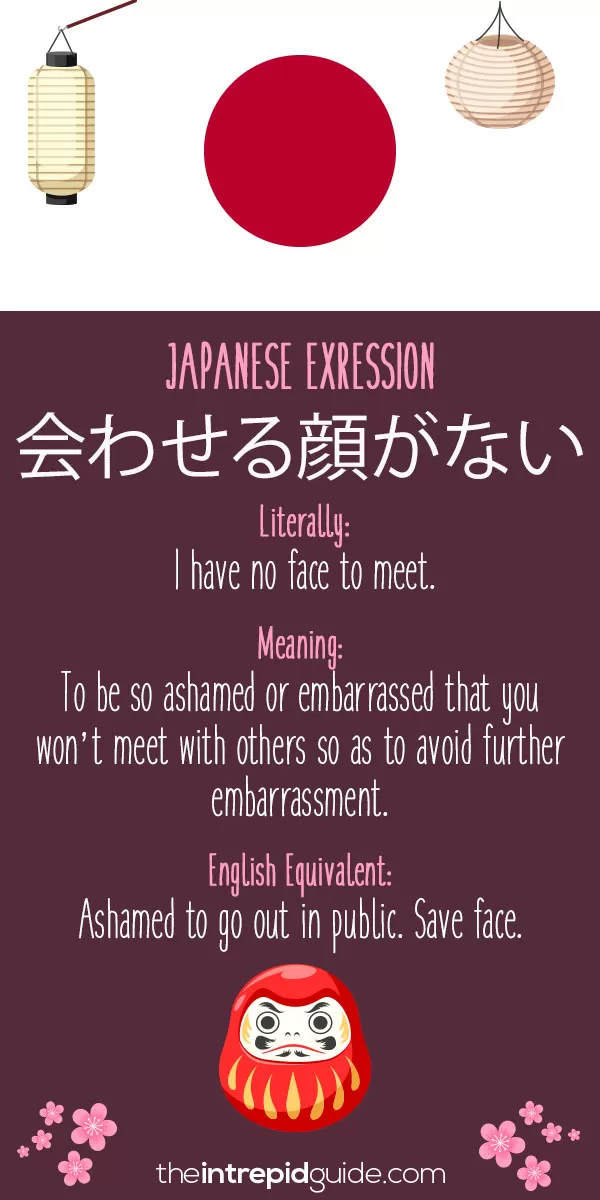
39. 口が軽い – Kuchi ga karui
Literal translation: A light mouth.
Meaning: Someone who can’t keep a secret.
English equivalent: Blabbermouth. Gossip. Loose-lipped. Tattletale. Bigmouth.
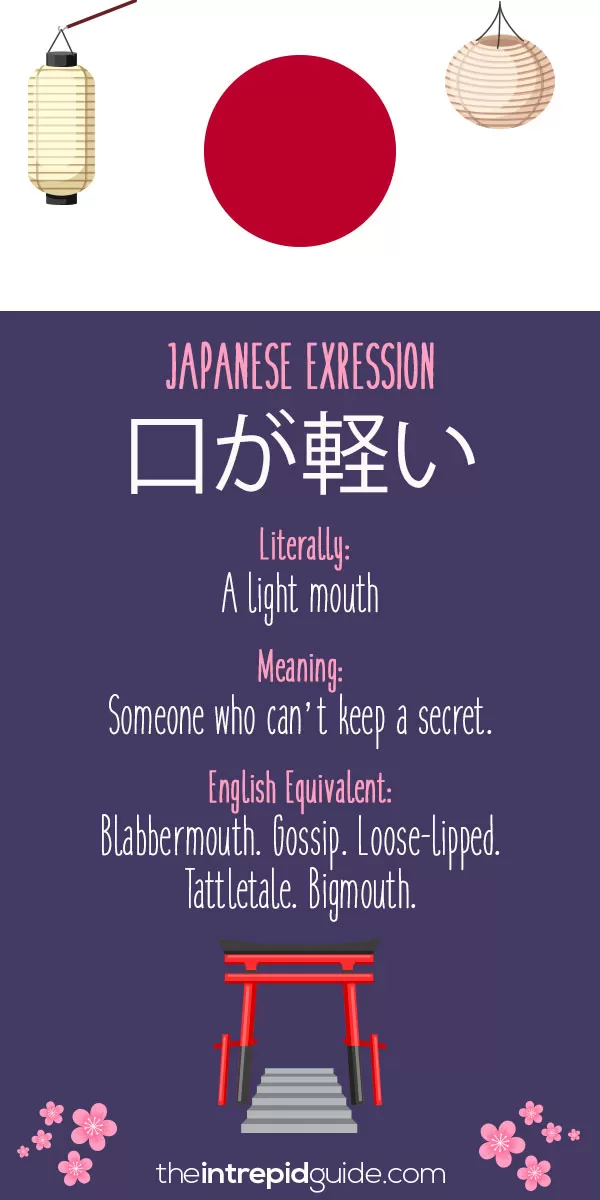
40. のどから手が出る – Nodo kara te ga deru
Literal translation: Get out of your throat.
Meaning: This Japanese idiom means to desperately desire something.
English equivalent: To want something desperately you can taste it. To kill for.
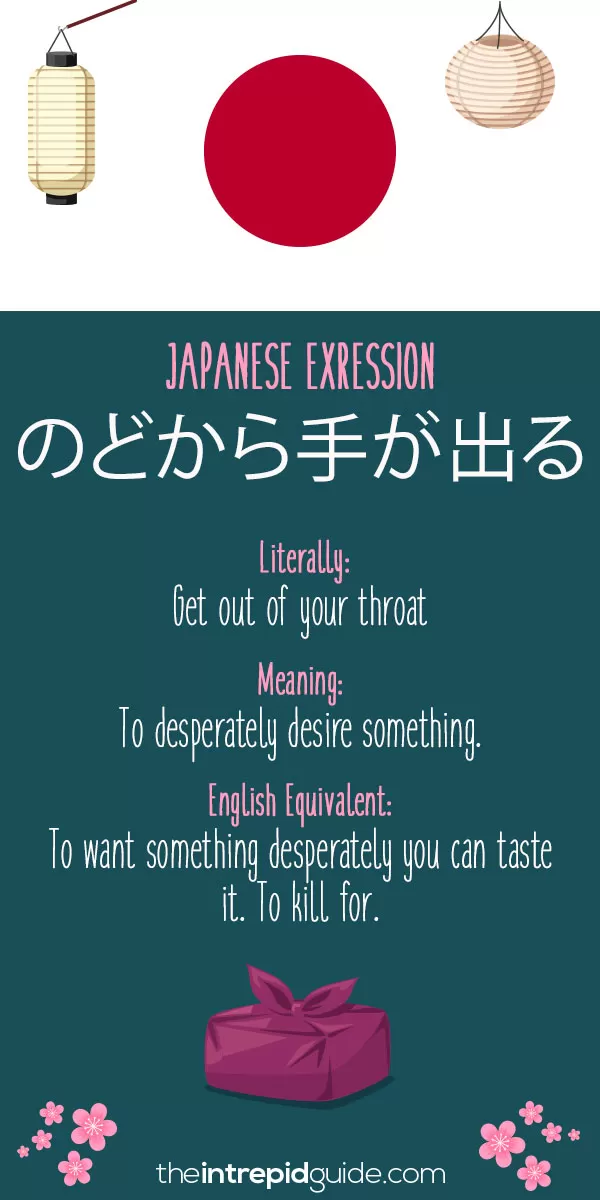
41. 大目玉を食らう – Omedama wo kurau
Literal translation: Eat a big eyeball.
Meaning: To be rebuked or severely scolded.
English equivalent: To be chewed out. To dress down.
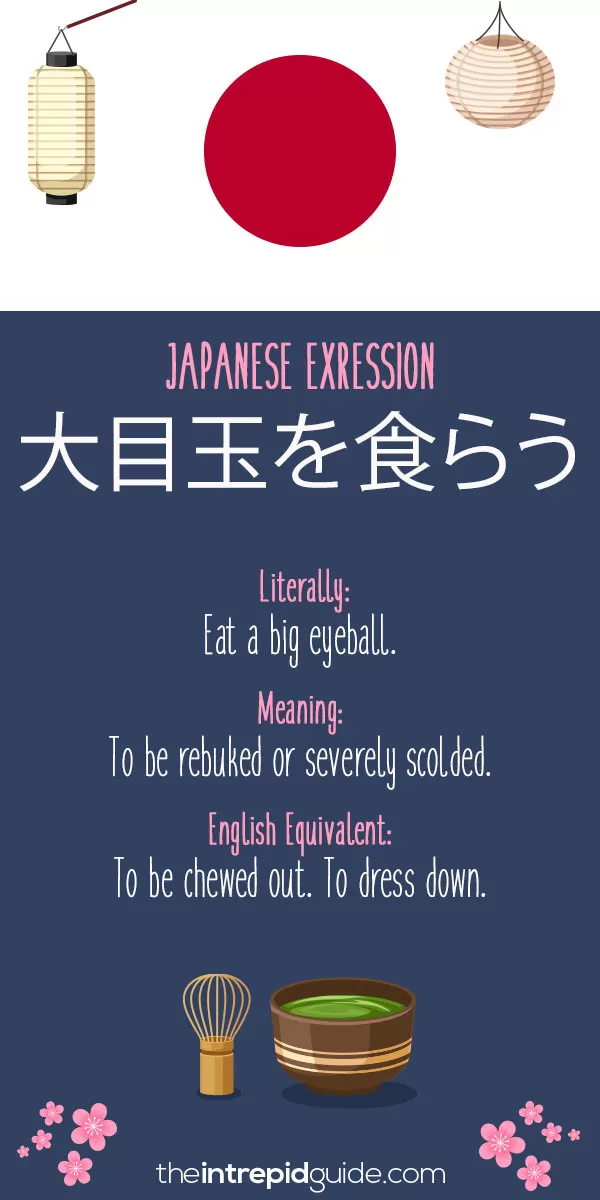
42. 手を抜く – Te o nuku
Literal translation: To pull a hand.
Meaning: To do a poor or substandard job.
English equivalent: Cut corners. Phone it in. To do a shoddy job.
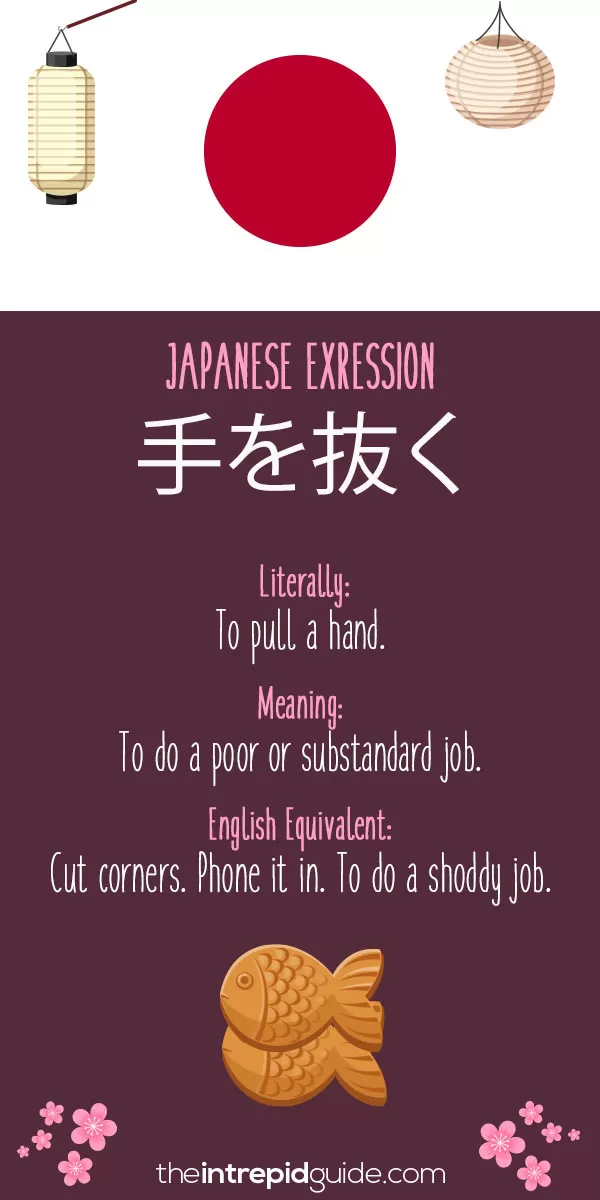
43. 雨が降ろうと、槍が降ろうと (あめが ふろうと、やりがふろうと)
Literal translation: Even if rain or spears are falling.
Meaning: This Japanese idiom states that no matter what happens, or however difficult something may be, it will definitely happen or be done.
English equivalent: Come hell or high water.
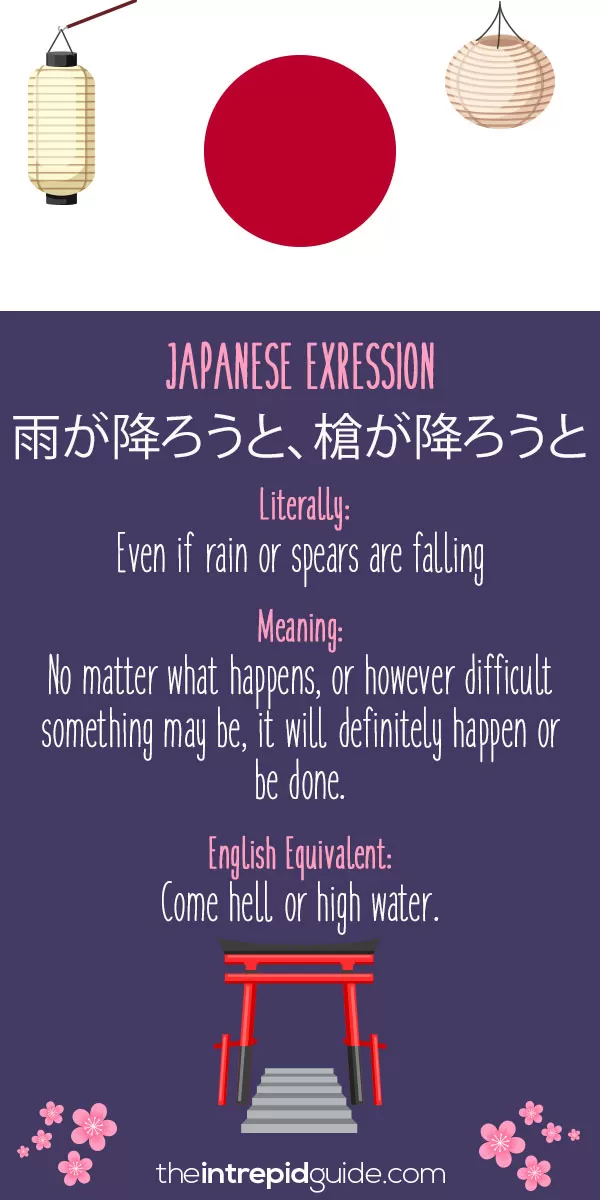
44. 砂を噛むよう (すなをかむよう)
Literal translation: Like chewing on sand.
Meaning: When something is dull, tedious, or uninteresting.
English equivalent: Dry as dust. Mind-numbing. Bored to death.
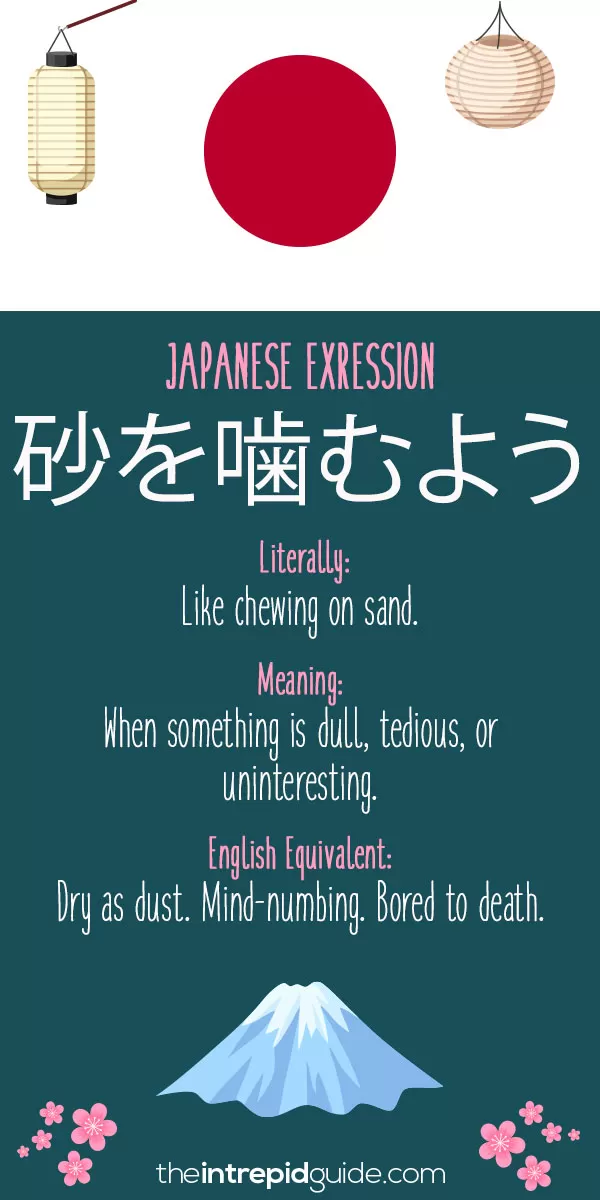
45. 猫も杓子も (ねこもしゃくしも)
Literal translation: Even cats and rice ladles.
Meaning: A lot of people.
English equivalent: Every Tom, Dick and Harry. Every man and his dog.
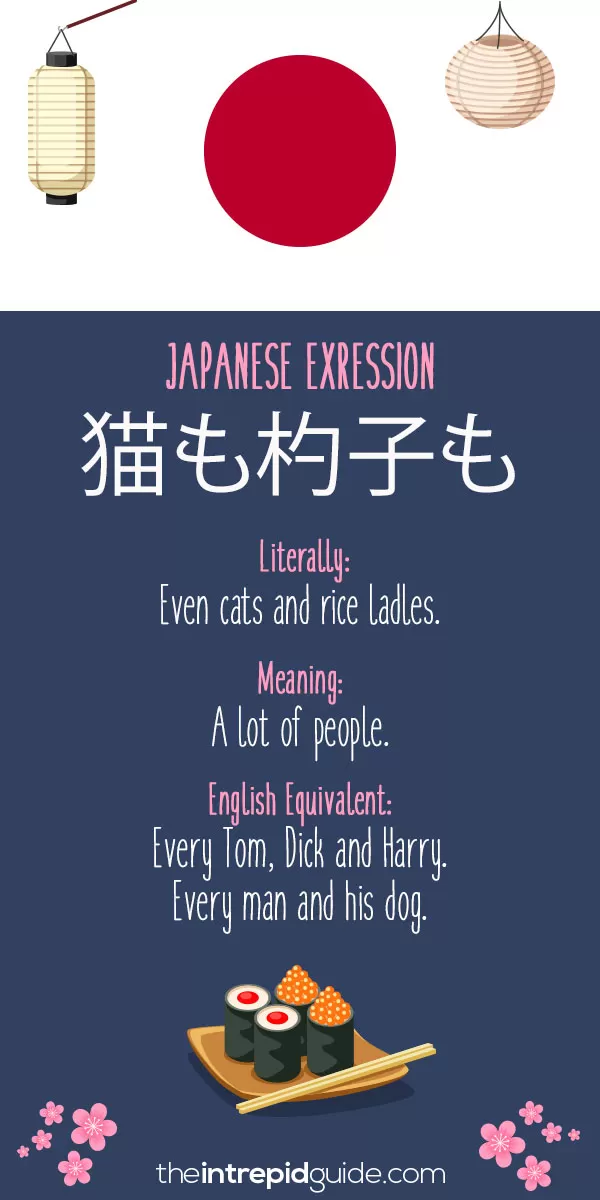
46. ごまめの歯ぎしり (ごまめのはぎしり)
Literal translation: Little fish grinding their teeth
Meaning: Something trivial and of no consequence. When tiny fish grind their teeth, it has little to no effect.
English equivalent: A whisper in the wind. To have bigger fish to fry.
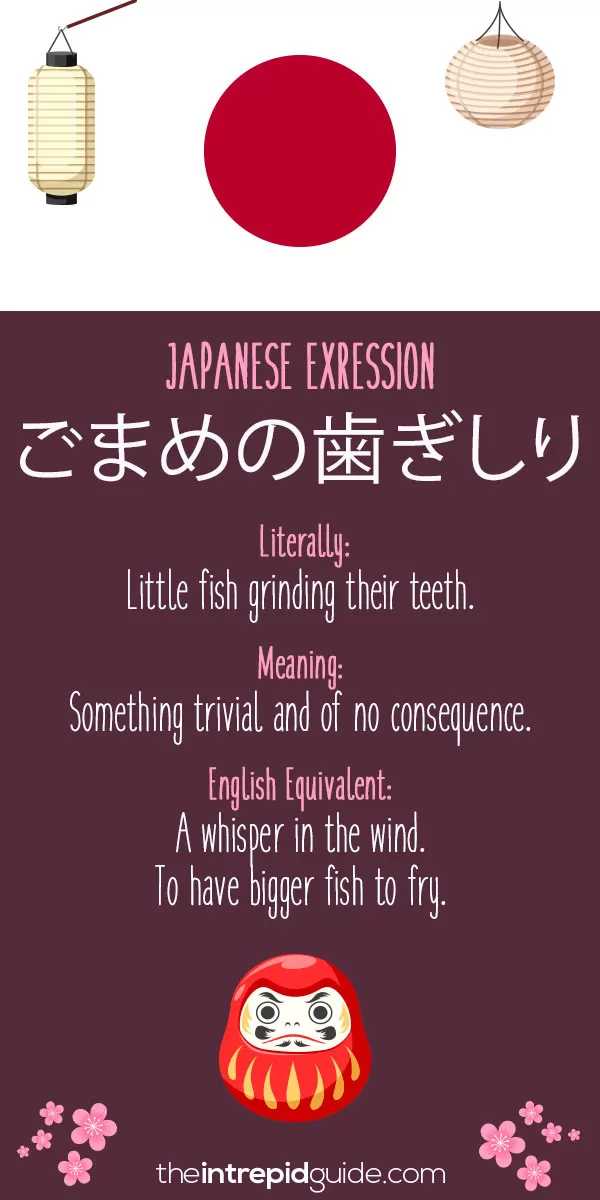
47. 月とすっぽん (つきとすっぽん)
Literal translation: The moon and a soft-shell turtle.
Meaning: This Japanese idiom expresses the idea that some things can be superficially similar, but completely different. The moon and a turtle shell are both round, but they are otherwise completely different – like the difference between heaven and hell.
English equivalent: Apples and oranges. Night and day. Like chalk and cheese.
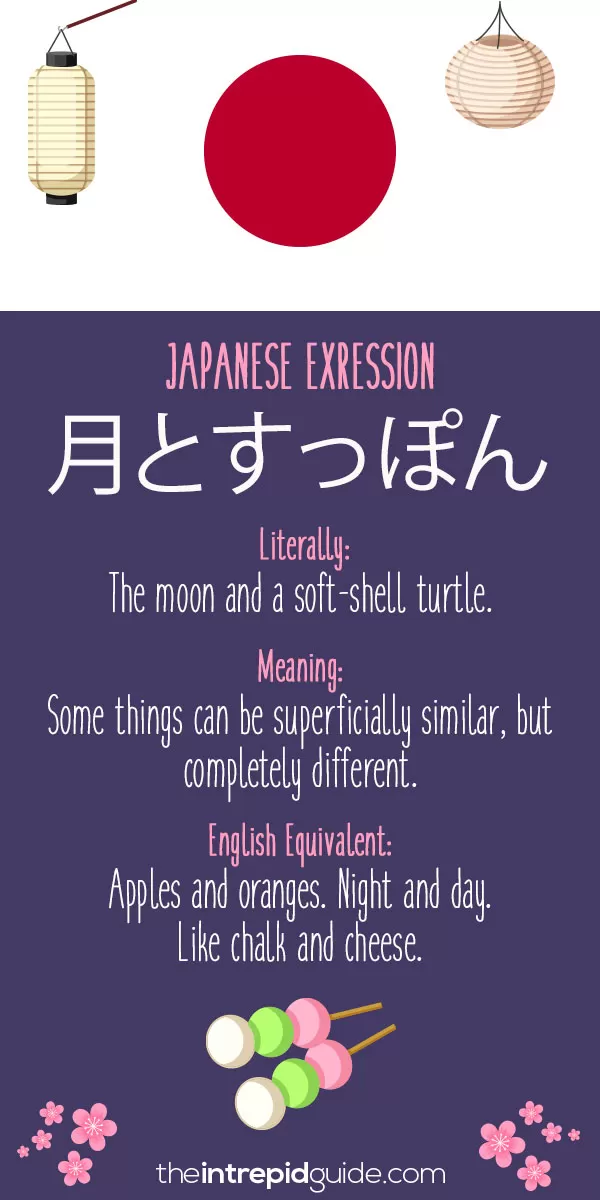
48. イタチの最後っ屁 (いたちのさいごっぺ)
Literal translation: The final fart of a weasel.
Meaning: The last thing you do or an emergency measure taken when cornered.
English equivalent: Last resort. Final measure. One last push. Last ditch effort.
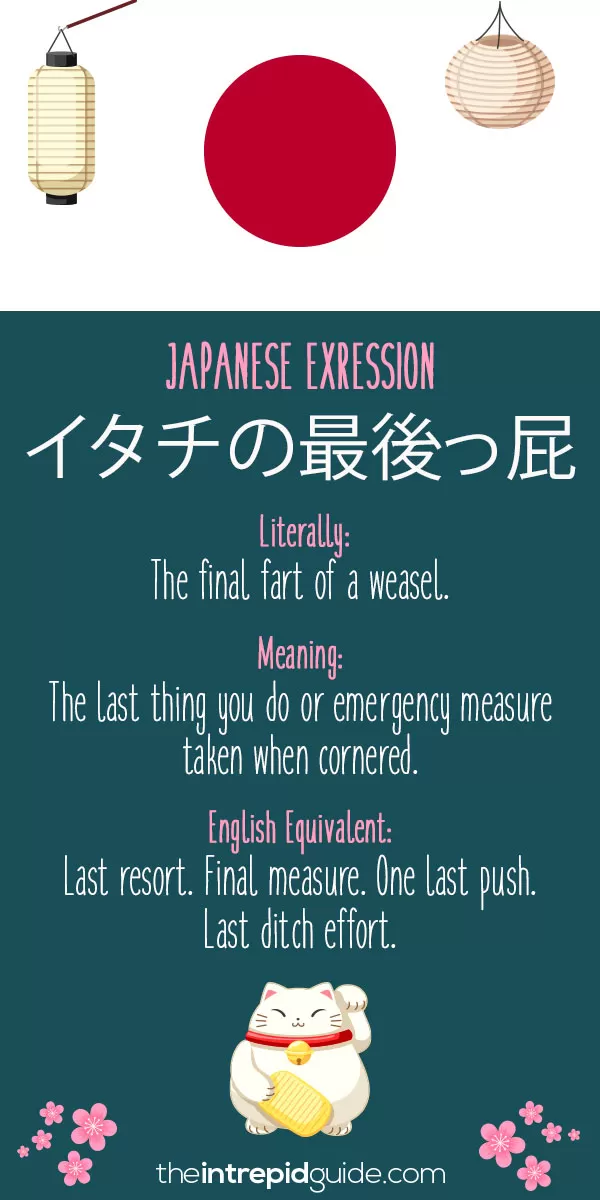
49. 寿司詰め (すしづめ)
Literal translation: Packed like sushi.
Meaning: To be squeezed together tightly in a small space.
English equivalent: Packed like sardines.
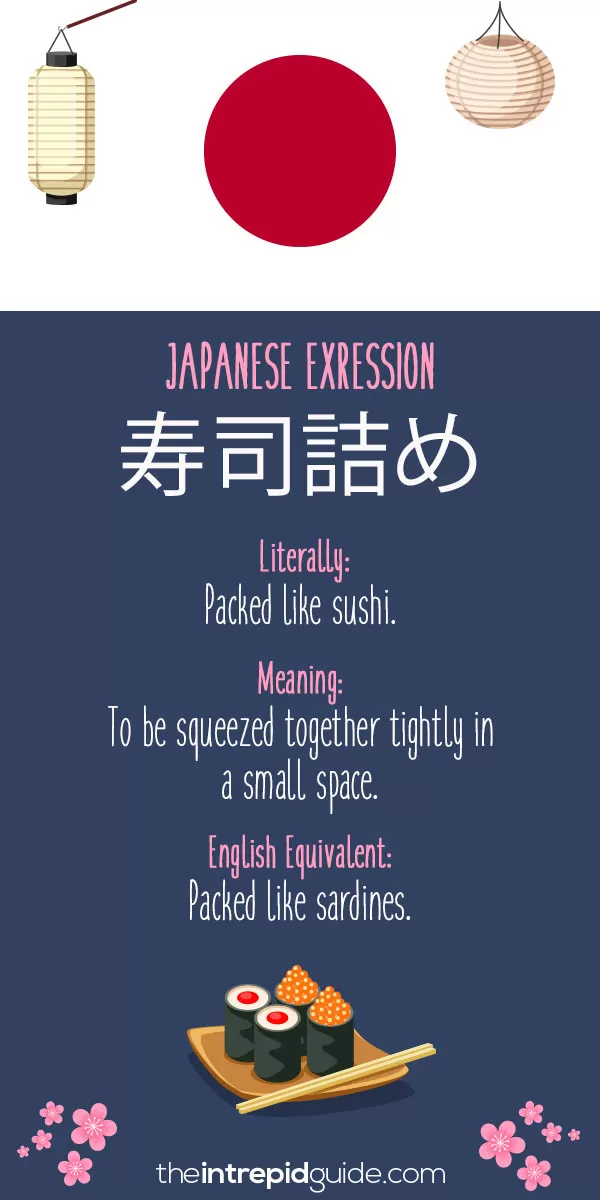
50. 朝飯前 (あさめしまえ)
Literal translation: Before the morning meal.
Meaning: This Japanese idiom means that something is so easy it can be done before breakfast.
English equivalent: A piece of cake. Easy peasy (lemon squeezy).
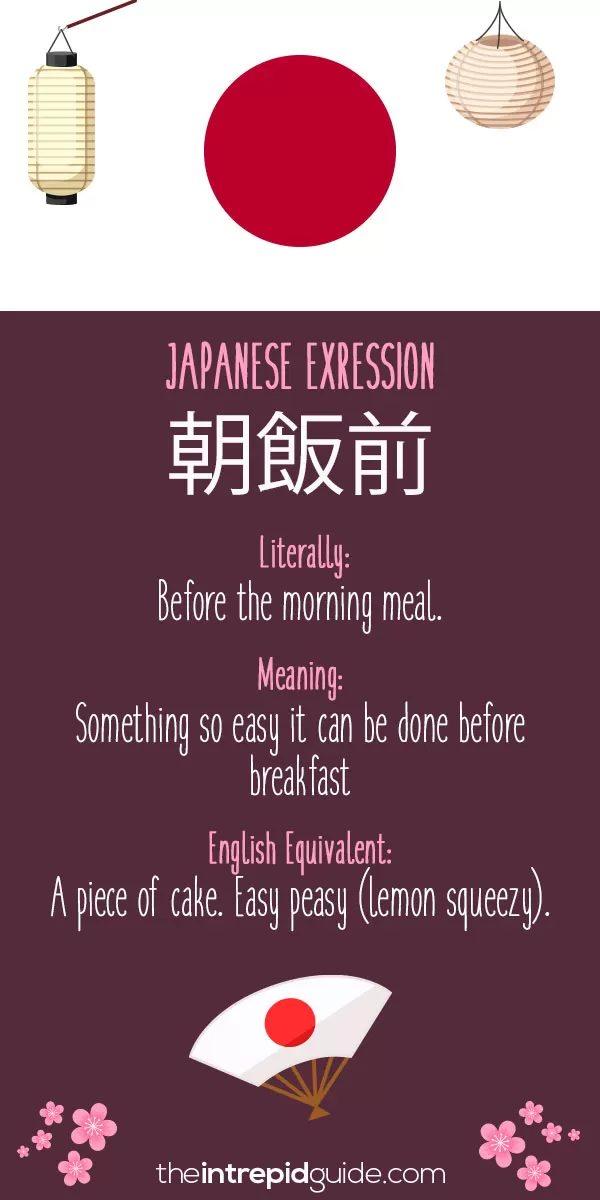
51. 窓際族 (まどぎわぞく)
Literal translation: The window tribe.
Meaning: Employees who have been promoted above their peers and now have a window-side desk instead of their own office like those in more senior managerial positions.
English equivalent: Suits. Drones. Seat warmers.
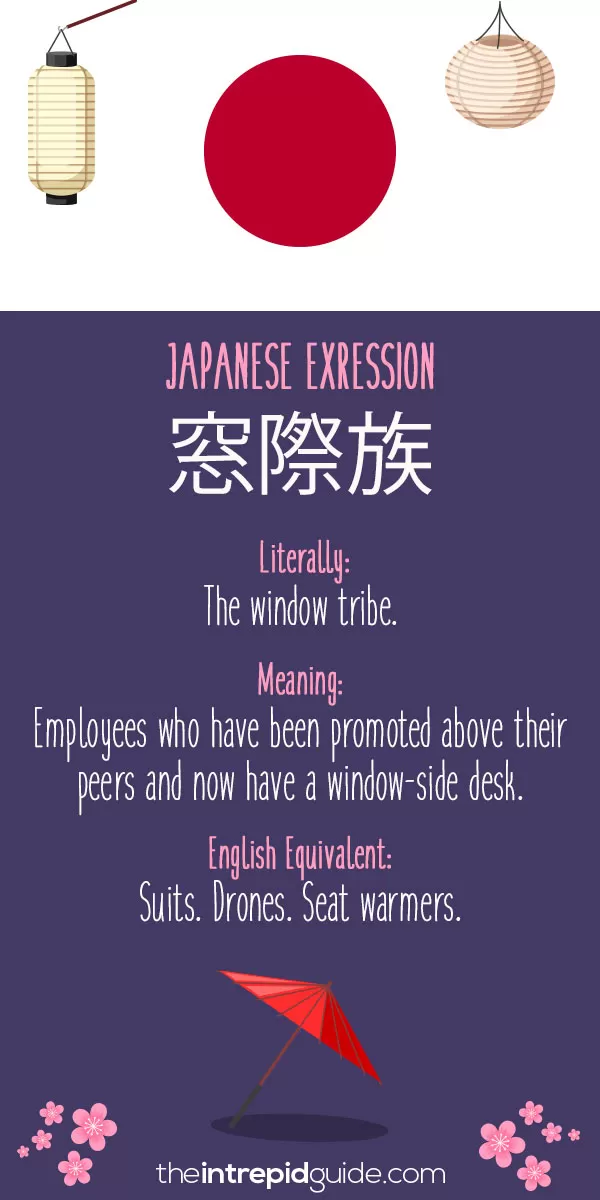
52. 地獄に仏 (じごくにほとけ)
Literal translation: My Buddha in hell.
Meaning: Meeting a savior like Buddha in a harsh situation like hell. When someones offers to help you when you’re in a bad situation.
English equivalent: A saving grace. My light in a dark place. Personal Jesus.
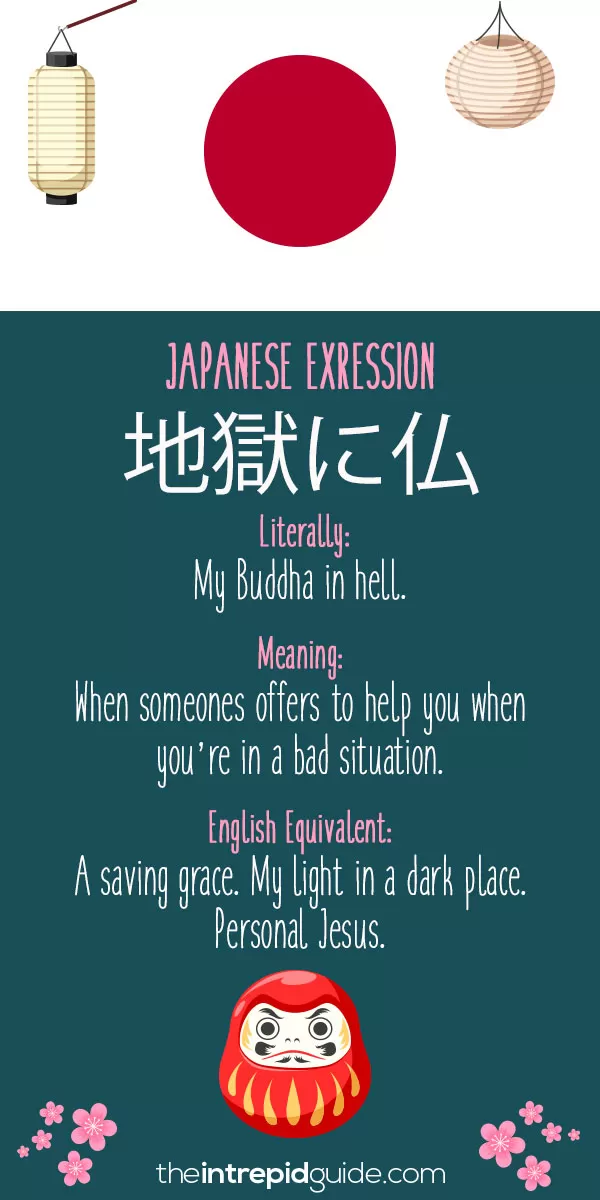
53. 内弁慶 (うちべんけい)
Literal translation: A warlord at home.
Meaning: Someone haughty and boastful when at home but meek and reserved elsewhere.
English equivalent: A man who is a lion at home and a mouse abroad. All bark and no bite.
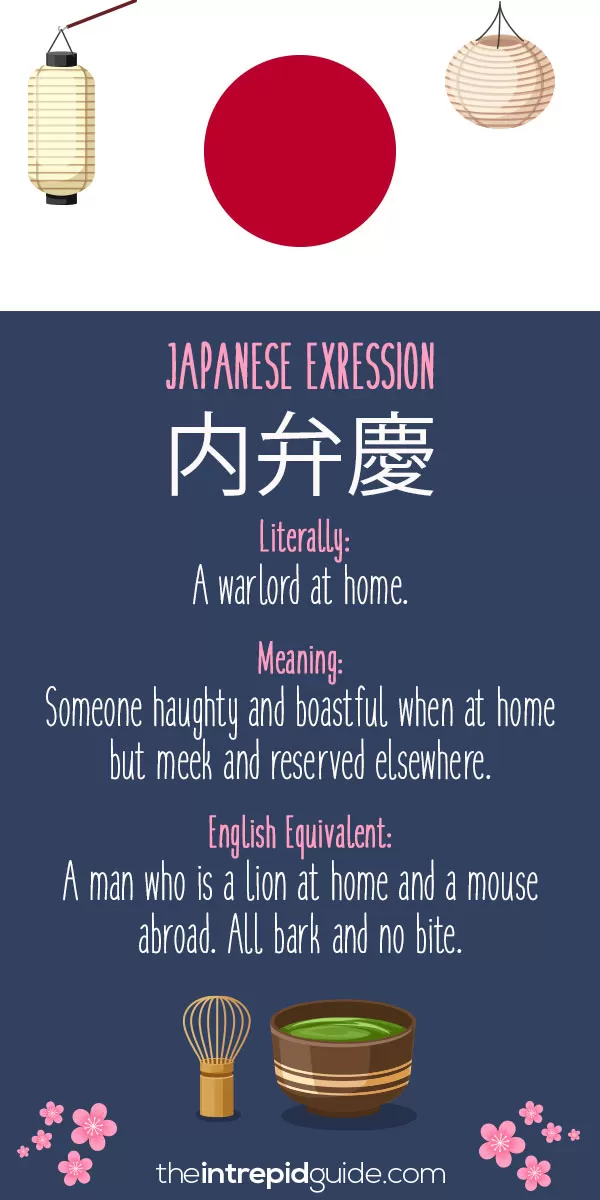
54. ちゃんぽん
Literal translation: Ching-boom. Champon (dish of noodles, seafood, vegetables from Nagasaki)
Meaning: Mixing things that are normally should be kept separate.
English equivalent: Mish-mash.
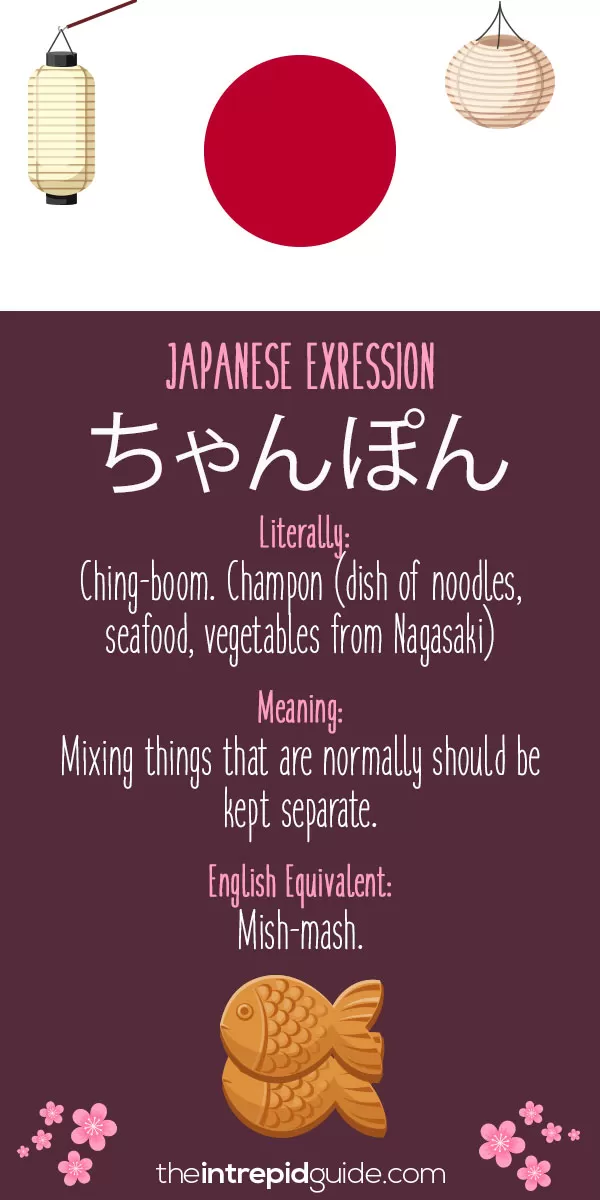
55. 暖簾に腕押し (のれんにうでおし)
Literal translation: Pushing shop curtains with arms.
Meaning: To exaggerate the importance of something trivial. Something not worth doing and considered a waste of effort.
English equivalent: Make a mountain out of a molehill. Haste makes waste. P**sing in the wind.
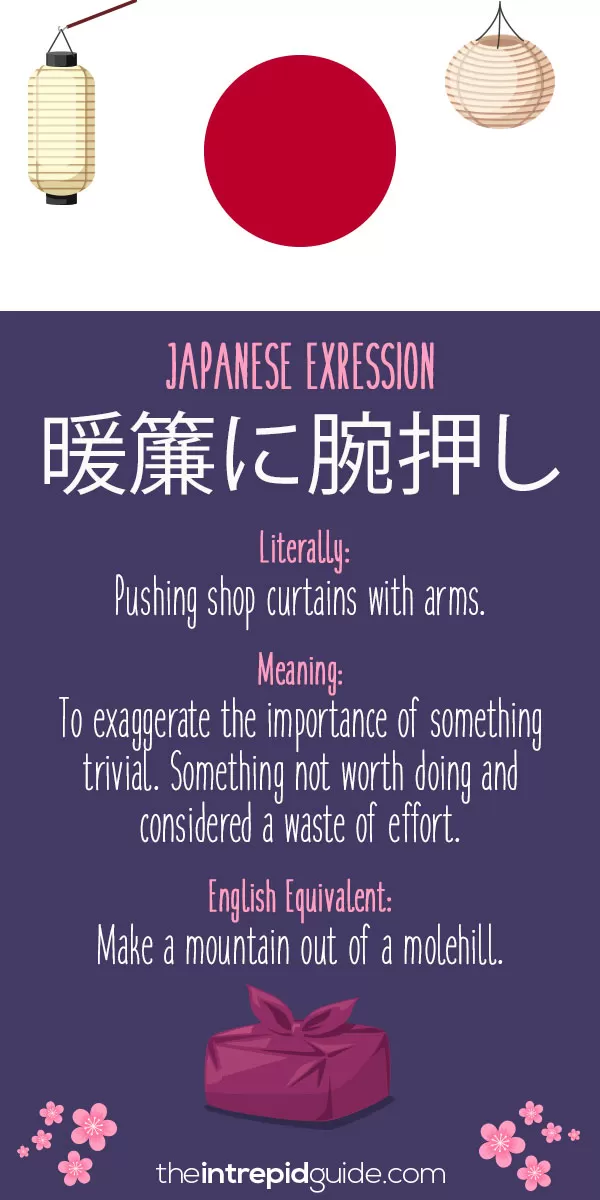
56. 小便横町 (しょうべんよこちょう/しょんべんよこちょう)
Literal translation: Urine alleys/streets.
Meaning: Narrow alleyways that are dirty and smelly.
English equivalent: Back alleys. P**s alley.
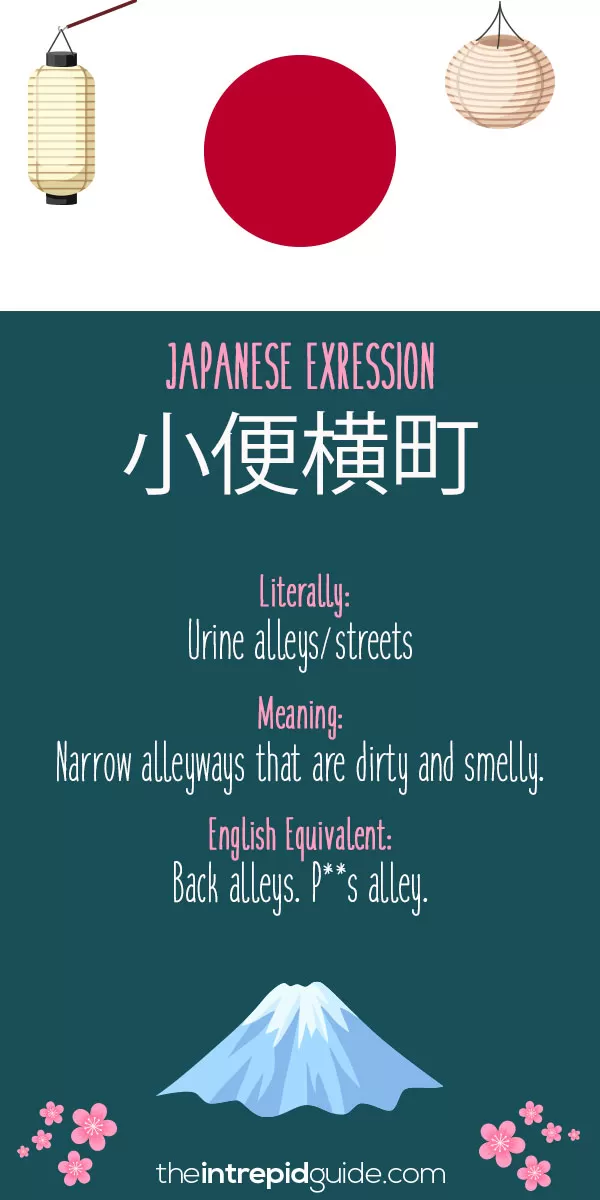
57. 出る杭は打たれる (でるくいはうたれる)
Literal translation: The nail that sticks up will be hammered down.
Meaning: By standing out and excel at something, you become disliked and invite criticism, so the best policy is to keep your head down.
English equivalent: Tall trees catch much wind. Tall-poppy syndrome.
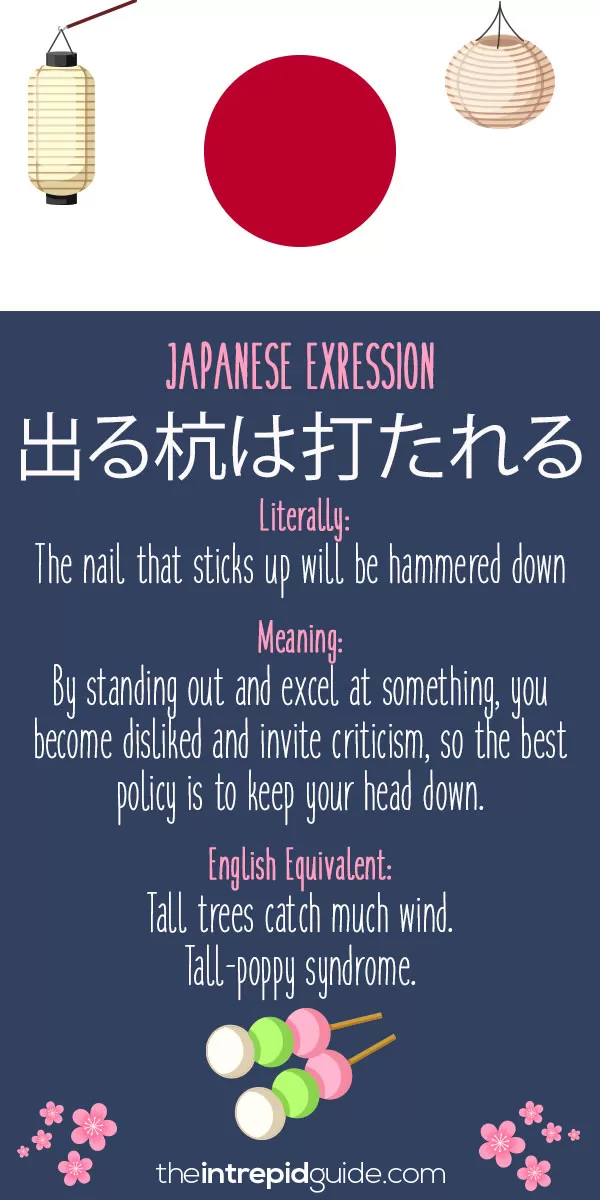
58. 鯛も一人はうまからず (たいもひとりはうまからず)
Literal translation: Eaten alone, even sea bream loses its flavour.
Meaning: Meals are only delicious when you eat them with someone. In Japanese culture, a lot of pleasure is felt when sharing a meal with loved ones.
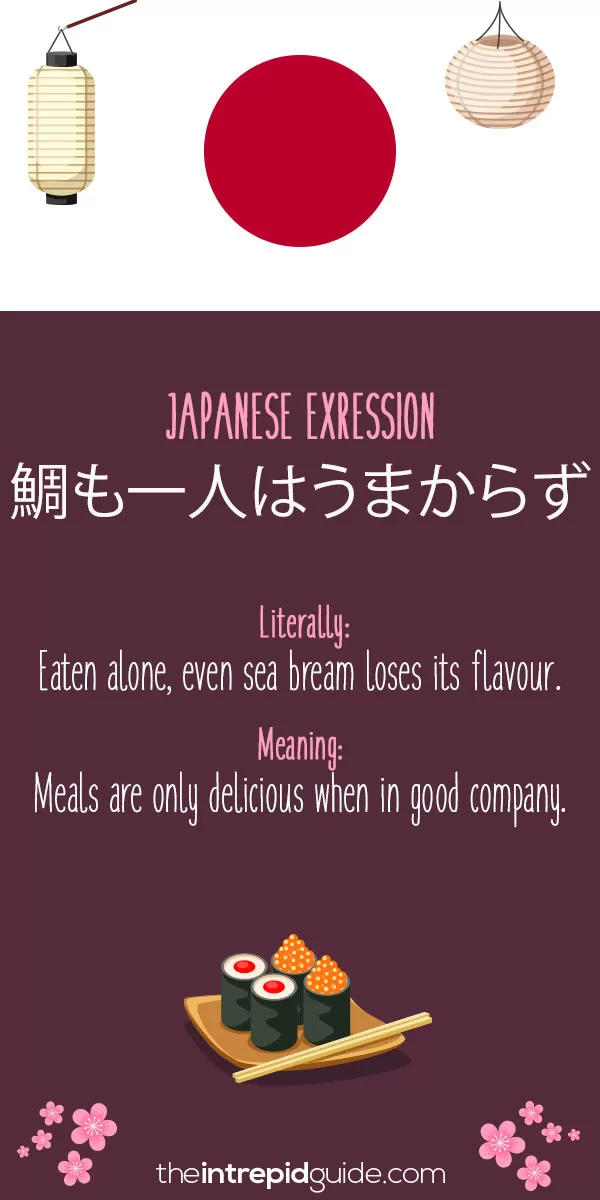
59. 腹八分に医者いらず (はらはちぶにいしゃいらず)
Literal translation: Eight-tenths full, keeps the doctor away.
Meaning: This Japanese idiom states that you should eat in moderation until your 80% full so you stay in good health and avoid having to take a trip to the doctor.
English equivalent: Everything in moderation. An apple a day keeps the doctor away.
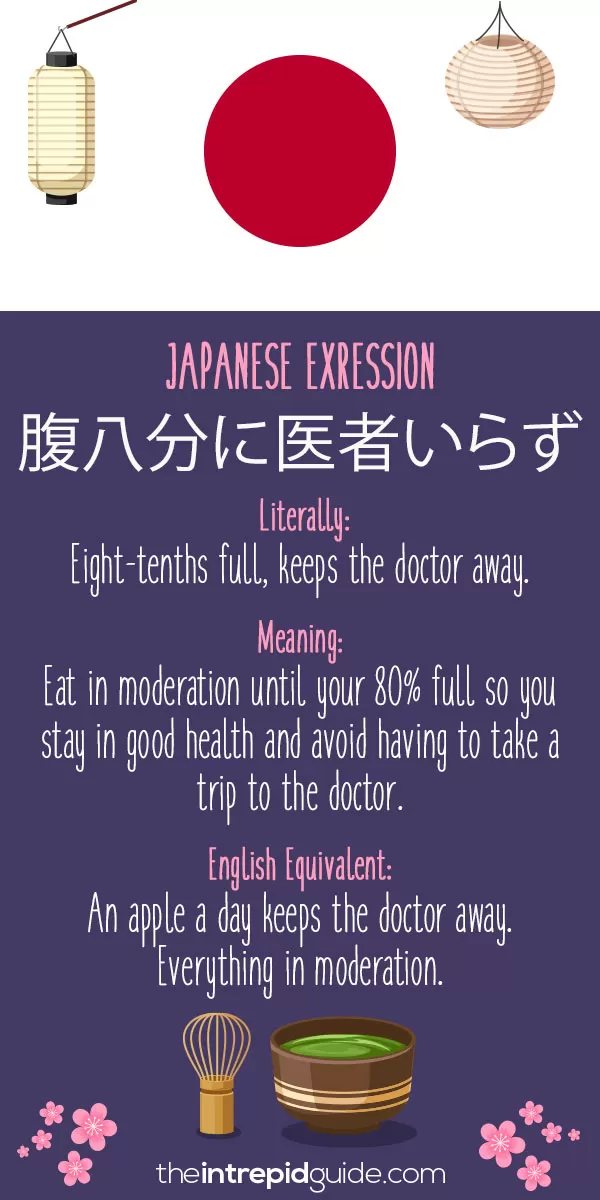
60. 明日のことを言うと天井のネズミが笑う (あしたのことをいうとてんじょうのねずみがわらう)
Literal translation: The mouse on the ceiling laughs when I say tomorrow.
Meaning: You can’t predict the future.
English equivalent: We make our plans, and God laughs.
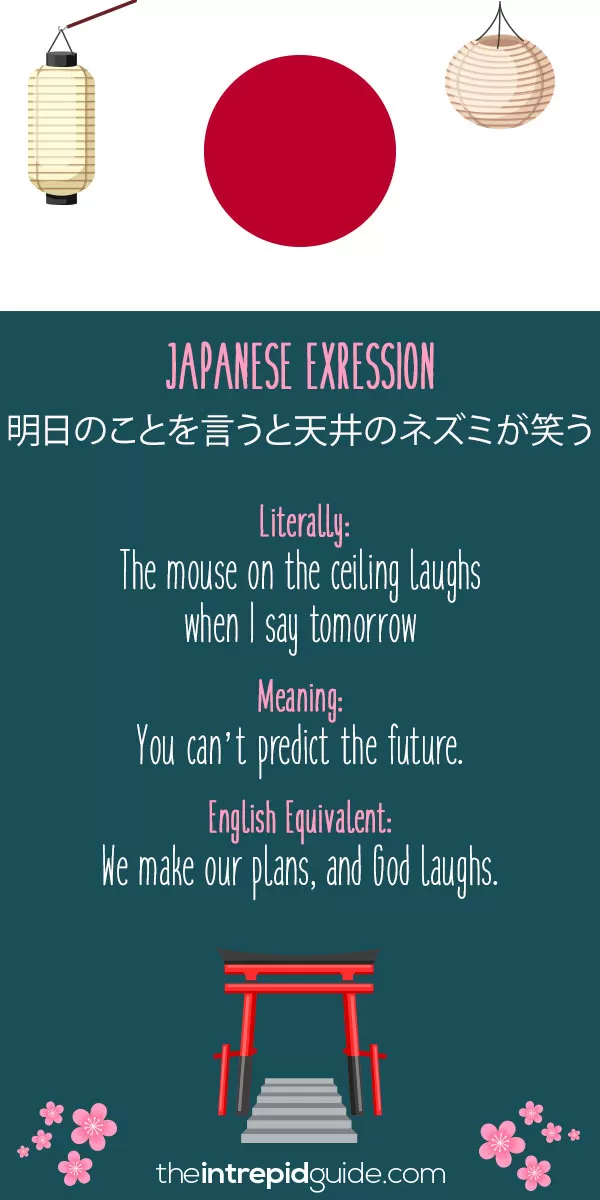
61. 明日は明日の風が吹く (あしたは あしたのかぜがふく)
Literal translation: Tomorrow’s winds will blow tomorrow.
Meaning: After a bad day, know that tomorrow you will feel better and that everything will work out in the end.
English equivalent: Tomorrow is a new day.
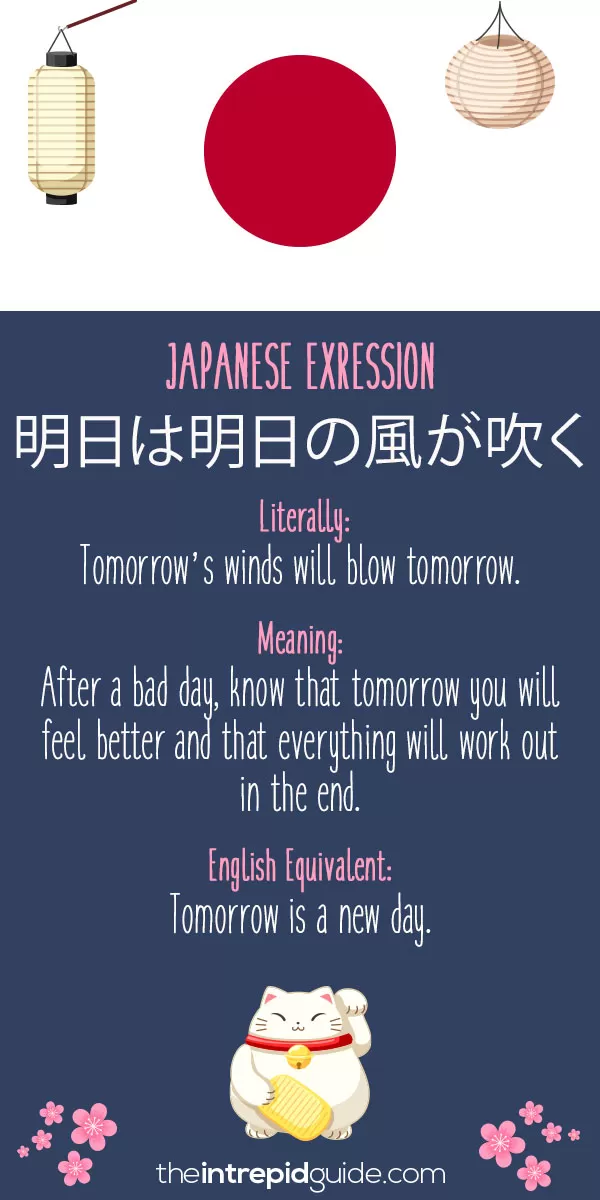
62. 雨降って地固まる (あめふってじかたまる)
Literal translation: After rain falls, the ground hardens.
Meaning: This Japanese idiom expresses the idea that by going through difficult times you build the strength and character so that you may be able to endure harder times in the future.
English equivalent: What doesn’t kill you makes you stronger. Rain settles the soil. Adversity strengthens the foundations.
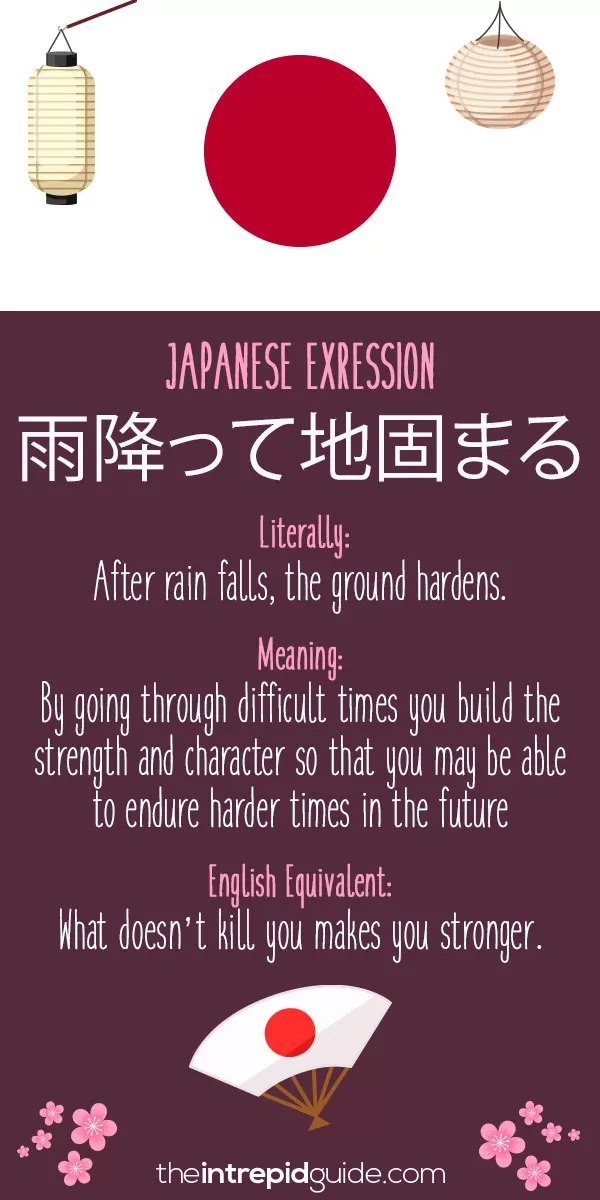
63. 相変わらず (あいかわらず)
Literal translation: The same as ever.
Meaning: Nothing has changed since the last time.
English equivalent: As usual. As ever. As always.
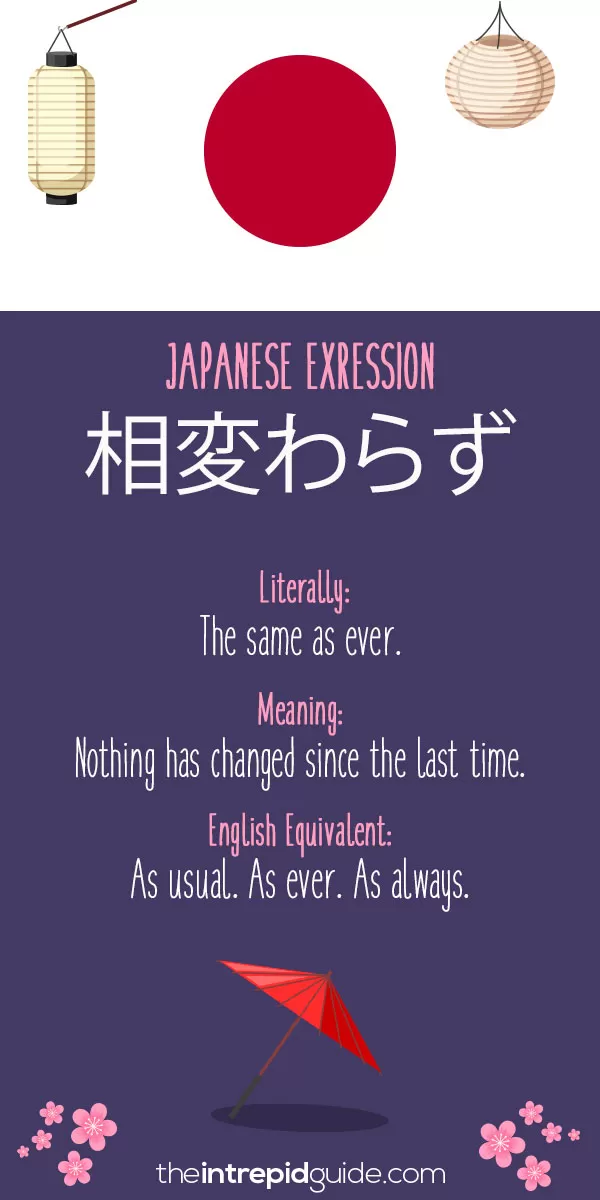
64. 天下り (あまくだり)
Literal translation: To command or dictate, or to fall from heaven/grace.
Meaning: In Japan, bureaucrats are often able to find high-ranking jobs in private firms after retirement. It can also mean to go from being superior to inferior by order or imposition.
English equivalent: Fall from grace.
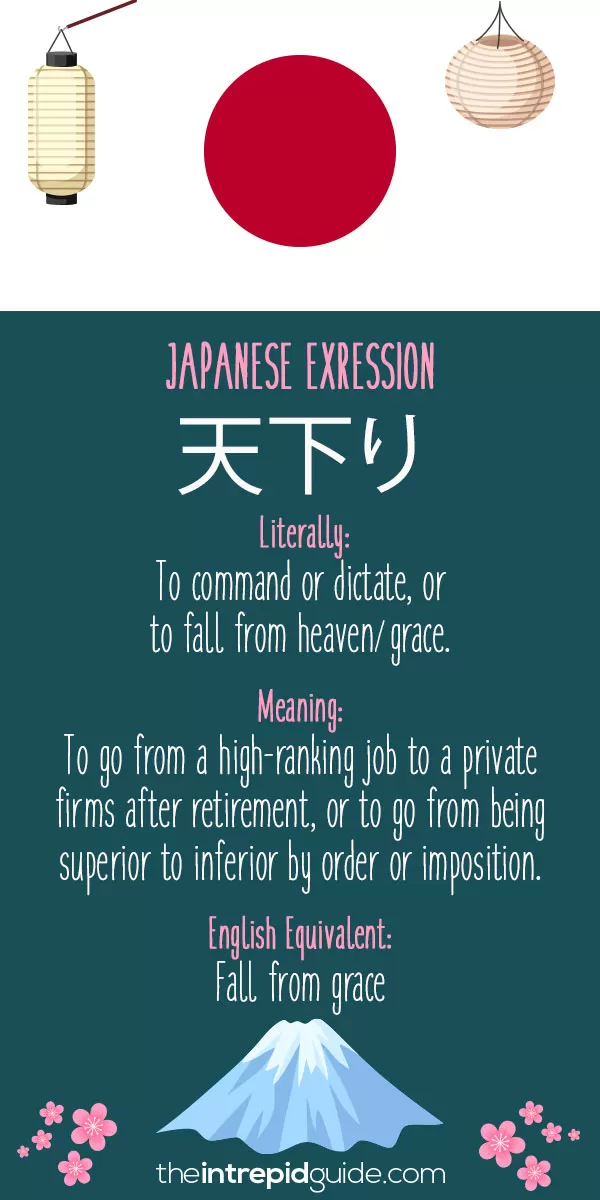
65. 口が滑る (くちがすべる)
Literal translation: A slip of the mouth.
Meaning: To reveal secret information unintentionally or indiscreetly.
English equivalent: Let the cat out of the bag. Spill the beans. Want to know where the expression “Let the cat out of the bag comes from? Check out my guide to the origins of English idioms here.
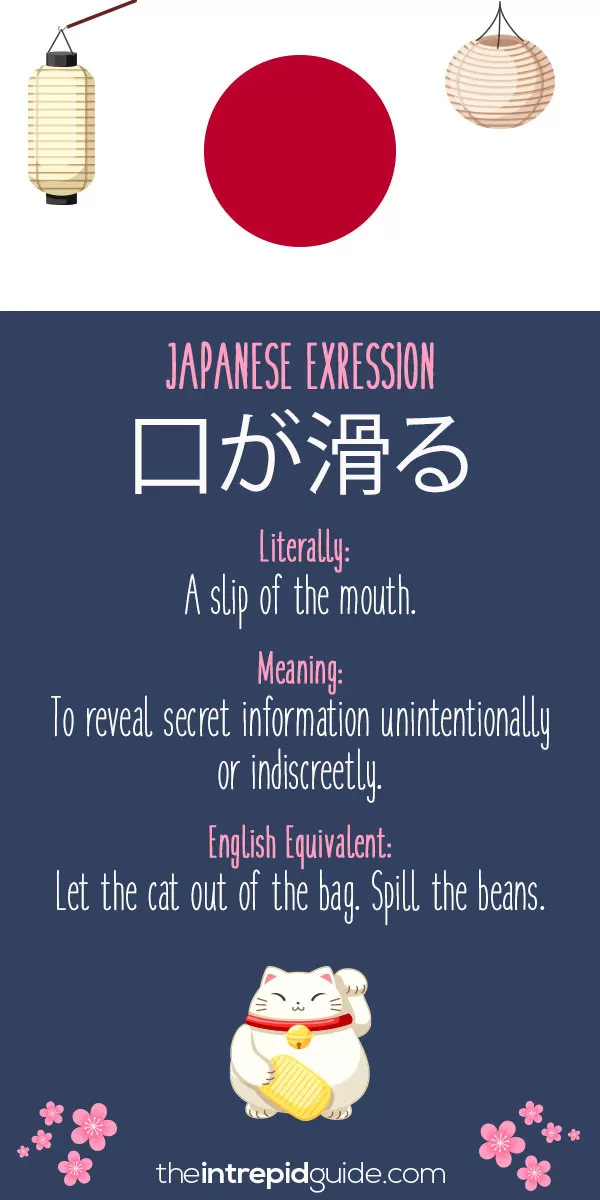
66. 因果応報 (いんがおおほう)
Literal translation: Bad causes, bad results.
Meaning: That good fortune will come to those who have done good deeds, and misfortune will befall those who have done bad deeds. This stems from the Buddhist philosophy of karmic retribution.
English equivalent: What goes around comes around. Just desserts.
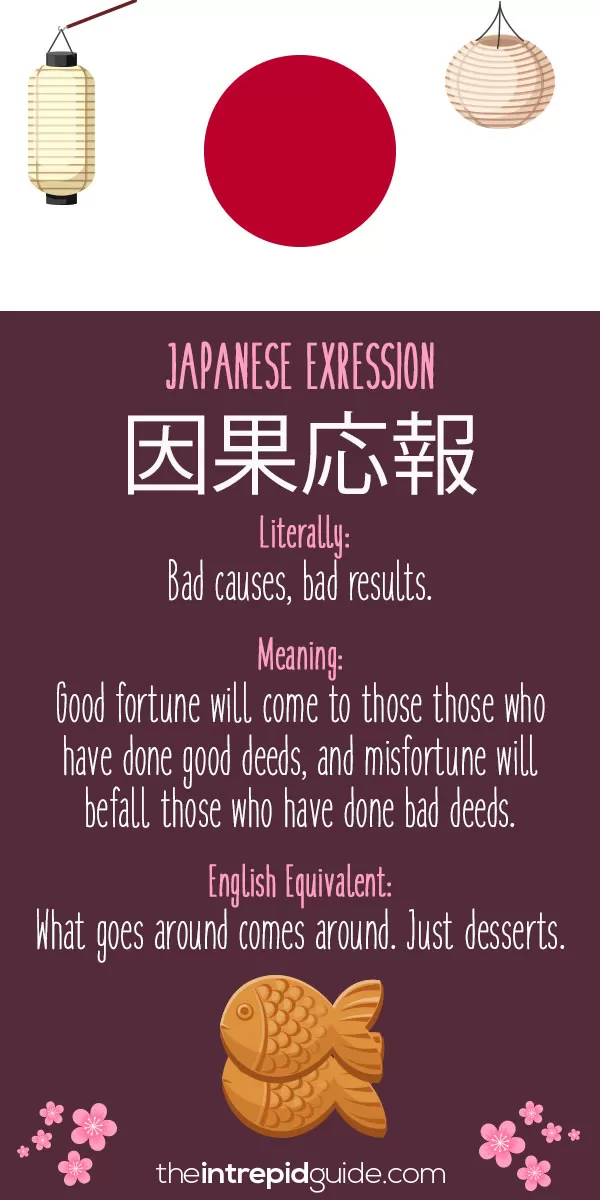
67. 花鳥風月 (かちょうふうげつ)
Literal translation: Flower, bird, wind, moon.
Meaning: A poetic phrase that expresses the beauties of nature by listing the kanji for “flower, bird, wind, moon.”
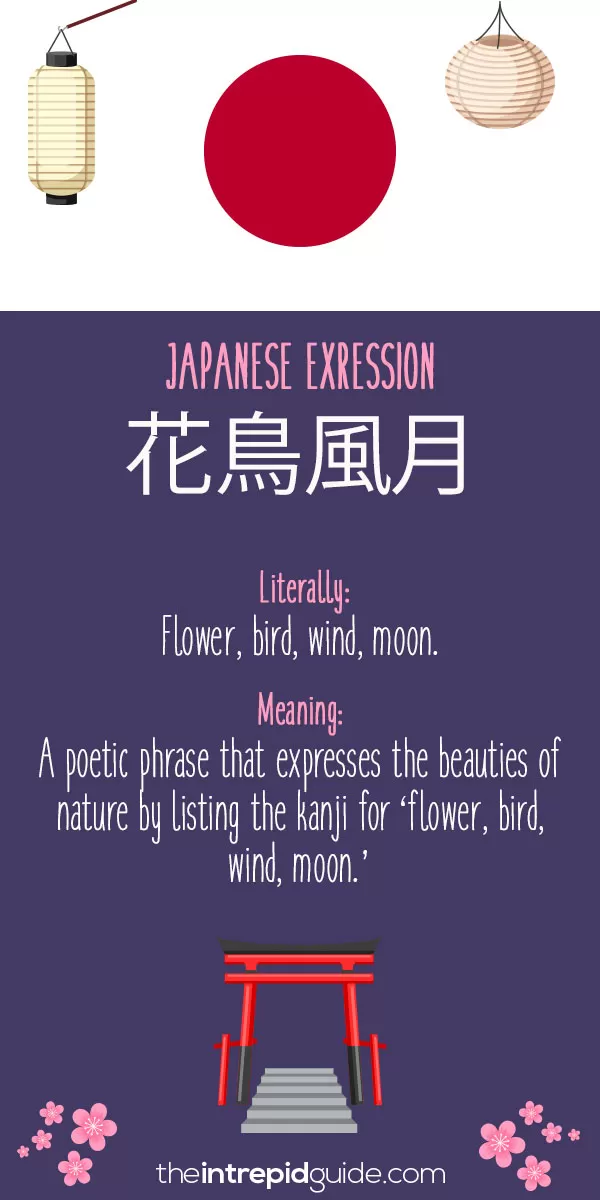
68. 一日一歩 (いちにちいっぽ)
Literal translation: One day, one step.
Meaning: This Japanese idiom encourages us to take each day as it comes and take small steps towards our goals.
English equivalent: One day at a time.
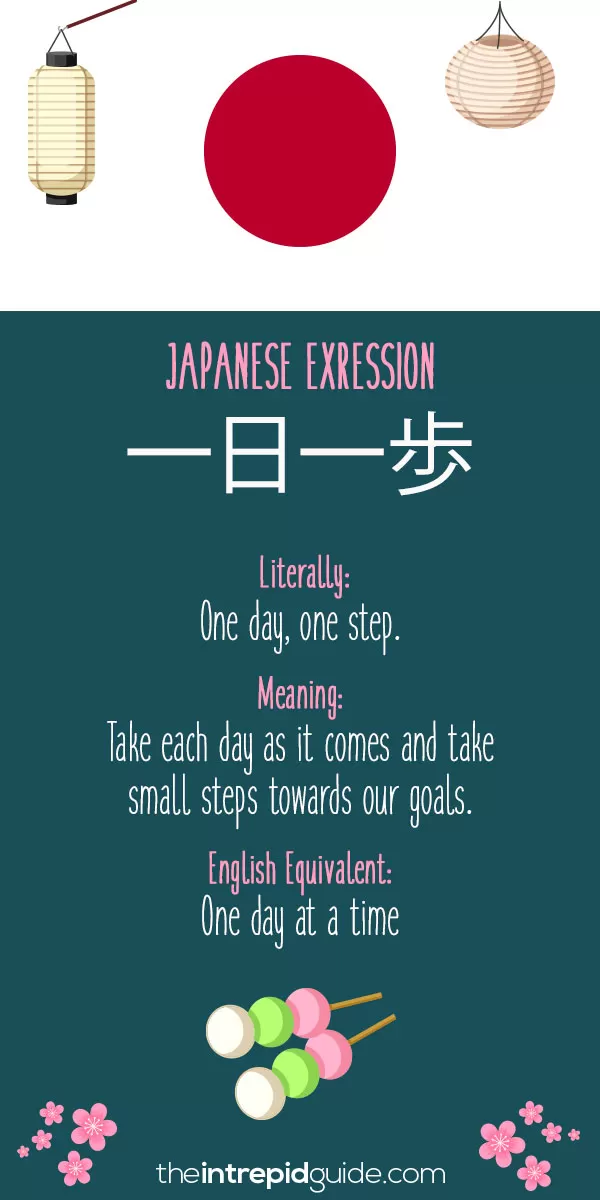
69. 温故知新 (おんこちしん)
Literal translation: Review past, know future.
Meaning: This Japanese idiom means that we should look back at the past to gain new insights and to take that knowledge into the future.
English equivalent: Learn from the past. History repeats itself. Forewarned is forearmed.
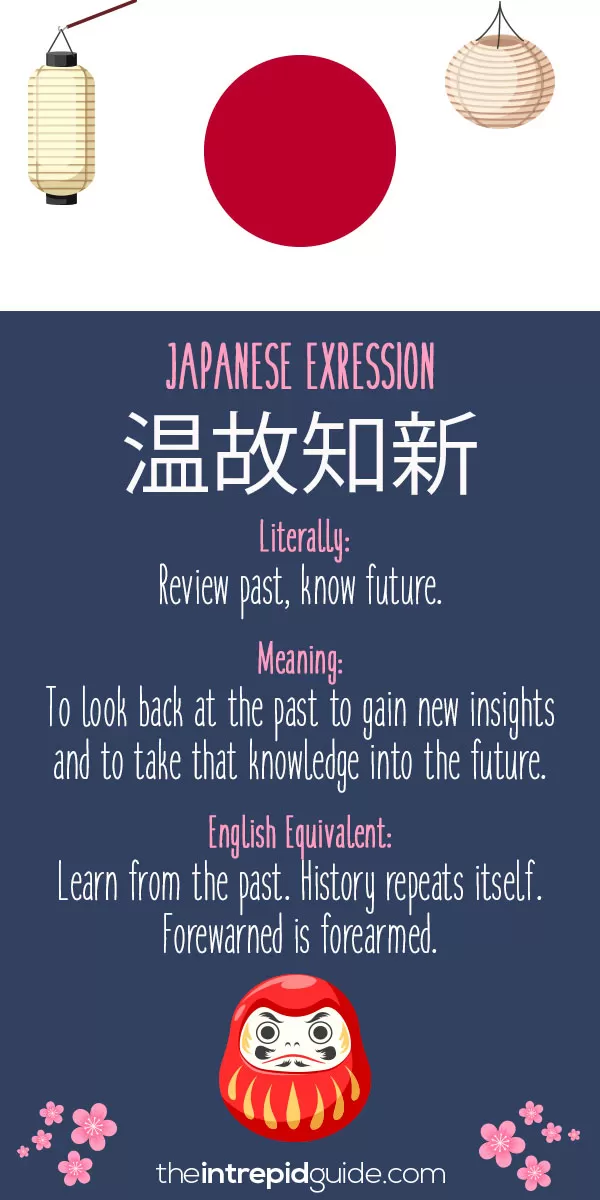
Want to have fun whilst learning Japanese? Struggling to find decent Japanese language resources? I recommend learning through the power of story with my friend Olly Richards Uncovered Japanese beginner course. It’s a fantastic story-based course which will take even complete beginners to a solid intermediate level. If you’re a bit more advanced, Olly also has his Grammar Hero courses for B1-B2 students and Conversations courses for A2-B1 students. Olly speaks 8 languages himself, so he really knows what he’s talking about. Check out Japanese Uncovered here.
Over to you!
Which one of these Japanese idioms is your favourite? Was it ‘even monkeys fall from trees‘ or ‘my Buddha in hell‘? Share your favourites in the comments. Can you think of any other Japanese idioms words? Let me know in the comments and I’ll add them to the list!
Want to know more about learning languages? Start here!
- How to Say ‘I Love You’ in 128 Different Languages [Ultimate A-Z Guide]
- 22 Top Language Learning Resources You Should Use
- 203 Most Beautiful Untranslatable Words [The Ultimate List: A-Z]
- How to Learn Languages Like Crazy, Even If You Have a Crazy Life [3-Step Method]
- 10 Proven Memory Hacks: How to Remember New Vocabulary Faster
- How long does it REALLY take to learn a language? [A Practical Guide]
- 18 Unexpected Advantages & Health Benefits of Learning A Foreign Language
- 23 Cool Gift for Language Learners They Will Actually Use and Love
- Memrise vs Duolingo: Which Language App is Best For You?
- Mondly Review: 10 Ways Mondly Drastically Improved My Language Learning
- 6 Language Learning Tips: How to Learn a Language from Home
- What Type of Language Learner Are You? Your 4-Step Personalised Learning Plan
- 44 Best Movies on Disney Plus for Learning Languages
- 13 Ways to Seamlessly Integrate Language Learning into Your Daily Life
- 10 Pro Tips: How to Learn a Language with a Full-Time Job
- 7 Reasons Why You Should Go on a Language Holiday
- Essential Travel Phrases: How to be Travel Fluent in 10 Simple Steps
- How to Learn Your First Foreign Language in 8 Simple Steps: A Beginner’s Guide
- 11 Life-Changing Reasons Why You Should Learn a Language
- 42 beautiful Inspirational Quotes for Language Learners
- Language learning tips: 11 Polyglots Reveal The Secrets of Their Success
- Top 10 Best Ways to Learn a Language Better and Faster
- How Many Languages are there in the World?
- 78 FREE Dictionaries to Learn a Language Fast [Free eBook Download]
- 22 KEY Travel Phrases That Will Transform Your Travels [Free Guide]
Like it? Pin it for later!


